#and thus fail to define what they mean by “morally good”
Explore tagged Tumblr posts
Text
in order to say "wei wuxian is morally good," you must first define what it means to be morally good
though this is by no means exclusive to them, one logical fallacy i sometimes see wei wuxian stans make in their arguments is that they begin their analysis of wei wuxian as a character with the statement "wei wuxian is morally good."
so their argument becomes:
wei wuxian is morally good.
a morally good person would do XYZ.
therefore, wei wuxian would do XYZ.
alternatively, when they're objecting to someone else's argument about wei wuxian, their counterargument becomes:
this argument says that wei wuxian would do ABC.
a morally good person would not do ABC.
wei wuxian is morally good.
therefore, wei wuxian would not do ABC; the other person's argument is wrong.
while this is in fact a valid argument structure to use for other kinds of traits (ie. "brave," "doesn't think of the consequences," even something like "afraid of dogs"), this format of argument in fact cannot be used for a descriptor as vague as "morally good"--because, unlike the other traits, "morally good" is not precisely defined enough for the above argument structure to work.
"morally good" is not a character trait in the same way that "wants to defend the weak," "is angered by innocent people being harmed," and "does not fear consequences" are character traits, because what is considered "moral" can vary significantly from person to person. what a utilitarian considers to be moral, for example, diverges significantly from what a deontologist considers to be moral. if i were to say "wei wuxian is a morally good person," i have frankly said less about wei wuxian's personality and more about what i myself believe to be ethical.
thus, the reason why the above argument pretty much never works in the wild is that the depolyers in question rarely actually define what they mean by "morally good."
consider the case in which two different wei wuxian stans write on their blogs "wei wuxian is a good person." however, the first person follows a moral philosophy that centers courage in the face of certain failure, while the second person follows a moral philosophy that centers reason and pragmatism. thus, what the first person actually means to say is "wei wuxian is someone who courageously chooses the correct path even when he is doomed to fail," while what the second person actually means to say is "wei wuxian is a reasonable and pragmatic person." these are no longer the same statement.
or consider the case in which the first stan follows a moral philosophy that centers agent-neutral harm reduction, while the second stan follows a moral philosophy that centers agent-relative reciprocity. in this case, what the first person actually means to say is "wei wuxian is someone who helps others regardless of whether they've helped him before," while what the second person actually means to say is "wei wuxian is someone who always repays kindnesses done unto him." again, these are no longer the same statement.
in general, if one wishes to argue that "blorbo is morally good," one must first specify what exactly they mean by "morally good," because not everyone follows the same definition of "morally good." many blorbo stans, however, don't actually do this. instead, they write their arguments as if their own definition of morality is already universal law; a reader can thus only reverse-engineer what the op believes to be morally good from their post. and this leads to no shortage of disagreements: two different blorbo enjoyers might find themselves in an argument over what they believe to be their blorbo's characterization, when in reality they are actually disagreeing over what it means to be ethical at all.
on the topic of disagreement, another fact that must be acknowledged is that wei wuxian himself is also a character with his own specific thoughts and feelings. wei wuxian is not an abstract paragon of righteousness whose definition of morality just so happens to perfectly match the reader's definition of morality; wei wuxian is a specific fictional character with his own specific thoughts as to what is right and what is wrong. and every reader has to accept that what wei wuxian considers to be right can in fact be gleaned from the text--and that what wei wuxian considers to be right will not always match what the reader considers to be right. wei wuxian might, in fact, disagree with you.
thus, if you want to make any sort of statement regarding wei wuxian's moral character (whether that be "he is morally good" or "he is morally bad") you in fact have to consider not just one, but four different questions:
what do you consider to be morally good? what moral framework and/or school of moral philosophy do you use to determine what is ethical?
how well do wei wuxian's actions adhere to what you personally consider to be morally good?
what does wei wuxian consider to be morally good? what moral framework and/or school of moral philosophy does he use to determine what is ethical?
how well do wei wuxian's actions adhere to what he himself considers to be morally good?
all of these are different questions! they cannot be conflated with each other.
to write a good analysis, you must accept that [what you consider to be morally good] will not always match [what wei wuxian considers to be morally good]. when such disagreements arise, rather than distort wei wuxian's character to match what you personally believe to be morally good, perhaps consider just allowing wei wuxian to disagree with you instead. even if he's doing something you honestly can't defend, maybe wei wuxian is still striving to live as best he can according to his own ideals, and it just so happens that his ideals do not match your ideals. you really should not distort wei wuxian's motives or beliefs just to make him more palatable to you, simply because you have wedded yourself to the idea that "wei wuxian must be morally good by my own standards."
closing thoughts: this isn't really exclusive to wei wuxian stans. i've seen all sorts of character stans in all sorts of fandoms make this same logical fallacy. i certainly think that some of the jiang cheng analyses i see from fellow jiang cheng stans are born less from an objective analysis of his character and moreso from the op's desire for his actions to align with their moral compass. but, out of all the characters in MDZS, it seems like people commit this logical fallacy when discussing wei wuxian specifically far more often than they do with any other character, save perhaps lan wangji.
#mdzs#yanyan speaks#yanyan haterpost#not tagging the man in question lmao#also its literally ok if he does something bad once in a while. it's not the end of the world. not everything he does has to be perfect#also i actually don't really see jiang cheng stans or jin guangyao stans doing this as much. tho they still do sometimes.#probably because both of those kinds of stans are aware they're arguing from a defensive position#so they have to be as clear as possible lest their argument be dismissed entirely#meanwhile certain [censored] stans take it for granted that everyone agrees with the statement “[ya boi] is morally good”#and thus fail to define what they mean by “morally good”#mo dao zu shi
110 notes
·
View notes
Note
saw one of your old posts about Davina and Bonnie. I know you ship Klonnie and I was curious if you think Klavina?(klaus/davinas) dynamic is what Klonnie’s would’ve started off as
I felt like Bonnie was robbed in canon but Davina is elevated in the show even when she’s kicked aside she still gets her happy ending by the end of it all.
Hiii!
So, while I used to be so against her, towards the end of the show's run, I didn't mind Davina because, at the end of a very long day, she was a kid caught in supernatural business. However, it was painfully obvious to me that Davina was who they refused to let Bonnie be. She was their pitiful attempt to erase Bonnie. However, it didn't work because she was quickly cast aside, which I believe was because they never had a real purpose for her EXCEPT to erase Bonnie.
With all that said, yes, the way Davina kept her foot on Klaus's neck would have been identical to how I imagined Bonnie would be. We already saw her be that way with Damon. Damon couldn't pass gas without Bonnie showing up to make sure no one else smelled it lmao.
The possibilities in which the two of them would eventually warm up to one another are endless, and I feel like every Klonnie story in existence has found its own ways of showcasing how the two of them would eventually come together.
I am a SUCKER for forced proximity which I think works excellent for Enemies to Lovers tropes. But I also think the two of them would just naturally realize that they're two sides of the same coin and find their stake in each other's lives that way.
(This next part is me rambling and has nothing to do with what you asked, so you can skip past the italicized text if you want lol.)
People always see Bonnie as this moral beacon that is full of light but if you really dig deep, Bonnie is a very dark character. She is the antithesis of evil, which does not always equate to what we define as 'good.' Bonnie's goodness is rooted in the way she masters evil, and she knows how and when to tap in. (For example: Trying to kill Damon by fire.)
Most "good' characters we see in media today aren't actually good, they're harmless. Elena is a perfect example of this. Just because she was physically unable to hurt a fly doesn't mean she was a good person. Her selfishness placed Bonnie in ugly situations plenty of times, but it was brushed off because she was trying to be good. (Think of how Seattle responded to the BLM protests and how it negatively affected the whole movement. They 'meant' well, but we caught the fire behind that mess.)
On the flip side, Bonnie would be classified as an 'extremist' if she was in a political landscape. That said, Klaus is also an extremist but on the opposite end. (Think 'right-wing' and 'left-wing' but without the political connotations.) In my opinion, this is why they work so well together but they're bound to bump heads because of it.
(And now, back to Klonnie!)
There are so many commonalities between the two of them that make shipping Klonnie so fun.
Similar to how two siblings can grow up in the same house and face the same trauma but end up polar opposites of one another, that's how I view Klonnie's commonalities (minus the sibling bit, obviously). They both faced similar traumas, but how they processed it turned them into different people. Klaus is the Yin to Bonnie's Yang.
Shared Traumas:
Parental Negligence
Bonnie: Rudy was negligent after Abby left him and Bonnie and thus Bonnie grew up alone with only Grams who failed to teach Bonnie about her heritage. (I'm aware it was against Rudy's wishes but I'm still side-eyeing lol.)
Klaus: Esther was negligent in keeping his father's identity from him and allowing her husband to abuse him. Also, she created that necklace to weaken him for her own selfishness, thus putting the target on his back when it came to Mikael.
Abandonment
Bonnie: Her mother walked out on her for no legitimate reason. Her father was always gone and Grams was an alcoholic (so they say). Even the people in her life were emotionally absent. Then you have her friends who left her to deal with the consequences of magic alone.
Klaus: After killing their mother, he had a deep fear of his siblings abandoning him. Therefore, he became obsessed with loyalty. His biological father was nowhere to be found until a thousand years later.
For brevity's sake, I'll stop with those two but they have others.
How they processed these traumas is so interesting:
They both gained an unnatural sense of loyalty, which lies in the fear of abandonment. Klaus forced loyalty onto others, while Bonnie gave loyalty to those who never earned it or didn't deserve it.
Bonnie became codependent on her friends because she had no one else, and Klaus became co-dependent on his family for the same.
Bonnie became overburdened by responsibility. She became everyone's 'go-to' for morality and protection, which gave her a skewed sense of importance, but it also burned her out. Klaus became controlling and constantly sought validation (from Elijah in particular).
Klaus ruled through fear because of Mikael's abuse. Everyone's acceptance of Mikael's abuse sort of validated his use of fear as a way of controlling people. Bonnie used her morality as a means of control for both herself and others.
Klaus is very self-loathing, and while Bonnie doesn't initially appear to be that way, she is too. Her strong moral code is just that, her way of torturing herself. (For example: Constantly sacrificing herself for 'good' simply because she has the duty of wielding magic.)
If Klaus controlled his siblings, Bonnie's control came with how she wielded that moral compass of hers. Seeing everyone around her live freely was triggering because she had to be responsible so early in her life. She never got to make mistakes. Mistakes meant abandonment to her, so she walked a fine line and tried to force others to do the same. (This may be why she struggled with her magic so often. I often wondered if the spirits were actually punishing her or if she was self-actualizing and punishing herself subconsciously.)
This is the tip of the iceberg with these two, but can you already see the pattern? My favorite aspect is how one craves what the other has. Klaus craves loyalty, and Bonnie craves control. They both want what the other (seemingly) has.
#klonnie#anonymous#asks#just me rambling about two idiots I can never let go of#anti-davina#anti-elena#not really but i'm tagging it just in case someone gets snarky
28 notes
·
View notes
Text
Saw a post about the Logan backstory that DPW might be referencing. The bits I want to talk about:
Mysterio tricked Logan to slaughter everyone in the Old Man comic run. But that plot, at least to me, doesn't make The Worst Wolverine. It probably makes the Most Tortured Wolverine -- the story of a man slaughtering his own family with his bare hands because he was mind controlled. Which inevitably created a power vacuum so gigantic that the world basically collapsed as supervillains take over the world. But the title of Worst Wolverine should belong to the Logan that completely abandons his most important moral value: to be the protector. The title of Worst Wolverine doesn't go to the man who got brainwashed and killed without knowing. The title goes to the Logan who killed indescriminantly and didn’t want to stop.
That would be true if this story is about Jesus and God (anchor being) saving the world. But Wade isn't Jesus. He's anti-Jesus, because he's an anti hero. Not Satan, which is the opposite of Jesus, but anti-Jesus. Perverted Jesus. A Jesus who saves by killing rather than offering (after) life. A Jesus who doesn't offer eternal life, but eternal death: killing those who need saved.
Logan is not a failed, coward of a god, but an anti-god. Again, not Satan.
This Logan isn't the worst version of Wolverine. He's the perversion of that character, a perversion of God. God saves living people if they agree to join him; people are saved in the afterlife--ie, saved after death. From the worse fate of eternal torture. If the worst of a good person is someone who doesn't help when they could because they're wallowing in their own self doubt....
An evil version would be a villain, selfish, laughing all the way, doing it for kicks because he hates everyone else.
An anti version is one who does the bad thing for the right reasons. Reasons no one else understands or agrees with.
A Logan who wasn't mind controlled while he killed everyone, fully knowing what he was doing, and freely chose to do that. Like the way Magneto is an anti-hero, trying to save his friends by killing other people. It's the anti version of that if Magneto "saves his friends".....by killing them.
Hear me out here: Wade knows he's fictional. Wade's most defining trait, when he chooses to become anti-Jesus, is that he does not want to be a slave. He succeeds in avoiding Francis. But when he becomes Deadpool, he learns he's fiction--and thus controlled by someone else, by god, by us. That's also slavery. He "escaped his fate" only to not escape his fate.
He and everyone else in the world are slaves of god. God of that world deliberately makes people suffer for his amusement: blorbo torture, because blorbo is not real but merely a toy--a slave.
How does one escape that? Get written out of the narrative. To escape slavery by author-god, you cease existing. Die. Only then will you not be a slave.
Eternal death as salvation. He only kills people who...deserve it.
To silence the voices in your head that control you...the anti version of IRL Jesus's eternal life via death.
Wade does the same thing: he kills those who are suffering from god the most, those who are damned to the fate he escaped from Francis. Who are being made to do evil things, who don't have a choice in the matter.
Villains. Like Francis was going to make him do.
Deadpool likes this Logan because this Logan IS him: Jesus and god are the same entity, just as Logan and Wade are.
If Jesus saves those who are damned.....who does god save? Everyone else.
If anti-Jesus saves those who are damned....who does anti-god save? Everyone else.
See how you can say two different things with the same sentence, if only your assumptions are different?
What can you do if you're a fucking liar like Wade, then? Say one thing and mean another, just like a double entendre. Let alone what you can say between the lines.
Wade only kills people who deserve it, because the most needy are who Jesus saves.
If anti-Jesus saves by killing, does anti-god save by allowing villains to live? Protecting and reforming them, getting them better lives? Because as god he's responsible for that?
God thinks everyone COULD be saved, if only they obeyed. Doesn't actually reach down and free anyone, does in fact demand obedience. Anti-god....thinks everyone deserves to be saved. Thinks no one should have to obey.
Wade's a fucking liar, but so is Logan: he couldn't have them thinking he wanted to be there, ie sent them away when they asked for help. Did he say no when he wanted to join them and just wouldn't admit it? Or did he not want to be with them at all, which is an equal interpretation of "incapable of telling them he wanted to be there".
Did the humans come and hunt mutants? Whose bodies were piled up? Is that truth or lie?
Was it really that he wanted to save the villains from slavery, it was too late, and it was the bodies of the villains he's upset about?
Worst Logan's world hates him because he slaughtered his friends, who were beloved by the world. He turned on the Xmen for killing people who attacked them. Did he kill them? Or did he just leave?
He ruined his world and did something unforgiveable: I think he killed them all himself. Lotta kids didn't get to grow up because of him, yeah? If he killed everyone in the school.....
Told them they looked ridiculous in their jammies they wore to....keep people alive, to kill villains, to kill people who were enslaved.
He couldn't help trying to save people, being there when it mattered most. Nobody understands why he did it, as not even the TVA are privy to the fourth wall....so they hate him. He's their worst. He earned that title by their books.
But Wade gets it.
Look back at what Logan does and does not say. Sure you can read a "he's a coward" between the lines....but you can also read anti-god, once you know he's a fucking liar.
Edit: "got you, fuck face": this isn't the good guy you think he is, this movie isn't what you think it is, and neither am i. We the audience are the fuck face
I also think Logan tried to tell his X-Men that this was all fictional. They're supposed to be all about helping people.... But they don't ever rehabilitate anyone. God would be disappointed they didn't actually want to help.
20 notes
·
View notes
Note
Looking back on the whole Ever After plot, I realized something. What was the deal with the Ever After railroading Team RWBY?
Like, if following Alyx' footsteps wasn't actually what they were supposed to do, then why did the Ever After seemingly force them to re-visit the same places Alyx did? Weiss tries to just cut the middleman and get to the tree and she gets comically looped back to the starting point. Ruby keeps walking in circles before meeting Little.
But then later on that just... stops?
The girls go whereever they want whenever they want, no looping. Is the implication that you can't move around freely in the Ever After if you don't have a guide? But that can't be the case either, because RWBY and Jaune walk around to their heart's content even when there are no Afterans in the group.
It's all just really confusing, tbh.
That's a good question and unfortunately I don't have an answer beyond the standard, "RT didn't think any of this through and thus an already confusing, convoluted plot has aspects that straight up don't make sense." More specifically, I think this is another example of the writers failing to create a divide between the audience/character's perception and what's actually going on. Meaning, yeah, they walk in circles at the start because they're following in Alyx's footsteps and Ever After won't let them go anywhere that's not a part of the tale. However, once characters and audience alike realize that this was an assumption on our part and they never actually had to take this route, there has to be another, real explanation for why that occurred... and there's not. RWBY just drops it. If we were wrong and they weren't forced to follow the tale and they therefore weren't going in circles as a result of that, why did they go in circles? No answer. There are plenty of possibilities RT might have played around with, such as having Curious manipulate them, or even (to my mind the less satisfying explanation) having the characters/audience attribute meaning to what's actually just random acts of a random world, but in the end there's no indication as to why this occurred. Not that I can recall, anyway.
Honestly, looking back I think Volume 9 is the worst of RWBY's writing, hands down. Because it not only perpetuates the problems we've seen since Volume 5-ish (how gray characters are treated, how heroism is defined, ignoring the Salem problem, etc.) but it also adds in a) a world that's meant to be ~wacky~ thereby giving the writers an excuse to put even less thought into the construction of this environment and b) it introduces incredibly heavy topics that many fans are uncomfortable seeing treated so insensitively. It's one thing to have bad writing in the silly fantasy story about cool weapons and simplistically evil monsters. It's more frustrating to have bad writing while trying to make ill-thought-out arguments about morality and depicting PTSD. It's very frustrating when that becomes bad writing tackling mental health on a wider scale, death, and the celebration of allegorical suicide. Volume 9 is positively riddled with problems. The lack of cohesion in the world building might be small potatoes compared to some issues, but it's still pretty noticeable once you give it a second glance.
44 notes
·
View notes
Text
I rewatched MHA and BSD recently and am having many a thought on both series and their themes/execution.
will flesh these out when it's not two in the morning but my notes thus far:
1. world-building (MHA is more interested in building the quirk system while BSD dances around how abilities fits into society. MHA focuses on a society is built around abilities, whereas BSD focuses on abilities built into society, if that makes sense? it works for each other their themes lol.)
2. themes (both deal with gray morality, though one could argue which does it better. BSD - what makes one human? what does it mean to be alive? what is the value in being alive? how much homoerotic subtext can we give the protagonist and his self-proclaimed rival? cycles of abuse and how one breaks free of it and/or heals past it MHA - what makes a hero? what is redemption? what defines a good person? what is forgiveness? how much can a person change? how much of a person's flaws can be attributed to breaks in the system? how can a system that failed those it swore to protect be broken down and rebuilt? how much homoerotic subtext can we give the protagonist and his self-proclaimed rival?)
3. abilities (surprisingly similar. how do they each handle their overpowered characters? how do they integrate the powers into character design/personality? how RELEVANT ARE THEY TO THE PLOT.???)
4. characters (obvious, but I'd argue BSD is much more character-driven where MHA is substantially more plot driven. shows in character development. MHA has incredibly vivid character design for its background cast, sure, but BSD ensemble is packed full of personality! they stand out!)
none of this is meant to imply one is better than the other. I just find the compare/contrast fascinating. I might expand on this more when I've actually gotten some sleep.
#my hero academia#boku no hero academia#bungou stray dogs#i find their comparisons intriguing to say the least#i enjoy them for very different reasons lol
20 notes
·
View notes
Text
The socratic method.
I sat at the couch, quietly sipping a glass of whiskey listening to the soft music. I felt a bit like a wealthy old man with a drinking problem, who finally got a few free hours for his true passion. In a way I was exactly that, with the exception that I am young. Not to mention that neither the whiskey nor the house I was drinking it were mine.
It was a rare time in which I chose to leave my usual small world of university, my apartment and coffee shops. It was a small get together for a friend’s birthday. The fact that I have friends, remains astonishing to me, but I assume enough people find my drunken ramblings amusing enough. Or my disregard and forgetfulness when it comes to money I am owed is convenient enough for them.
‘’Do you believe in morality, Peter’’ I spoke to the host who had sat next to me.
‘’Don’t start please. Can’t we have a normal fucking conversation for once?’’
‘’What, you want to talk about the weather? Or movies we saw, or whatever things people we know have been up to? What precisely constitutes a normal conversation to you, that you haven’t had with me already?’’
‘’You don’t make it easy to be your friend’’
‘’I don’t see the gun at your head forcing you to be.’’
Peter sighed. He always indulges me, sooner or later, yet another mystery. I believe he enjoyed this as much as I did. It was a part of a little game we play, I think. Or he just likes me for some other reasons and he chooses to put up with this. I’ve often been meaning to ask, but never got around to it. The question seemed stupid, in some way.
‘’I guess I do, you know, you can’t go around killing people, robbing them and stuff like that’’
‘’Says who? If there are rules, someone must have made the rules. And since all men are supposedly equal, nobody has authority to make rules that apply to another. Therefore we can’t create a single, objective set of rules.’’
‘’Then you have as many individual set of rules as you have people.’’
‘’Precisely’’ I smiled camly. I loved the attention already.
‘’However most systems of rules seem to agree on most basic stuff across all cultures. Murder, unjustified violence, however you define ‘justified’ and mostly things that prevent society from functioning.’’
‘’So you agree that all morality is based on convenience?’’
‘’In a way. Traits that helped species survive and all that.’’
‘’So there is nothing inherently immoral in me killing someone as long as it helps me achieve my goals?’’
‘’It’s a good thing you don’t have any goals.’’ Peter laughed
‘’You didn’t answer my question.’’
‘’Because you don’t argue in good faith. You know perfectly well, that this type of thinking or behavior won’t lead you to your actual goals.’’
Fuck, I forgot I was talking to him. The guy knows me since we were kids and I might have drunkenly told him too much once or twice.
‘’And yet, if it would, there wouldn’t be anything inherently immoral to me doing it’’
‘’I suppose not, but your hypothetical is inherently absurd, because it requires a person to be devoid of empathy, thus humanity for him to be able to live with killing someone in cold blood, which would in turn make any kind of goals he sets for himself meaningless.’’
‘’Again we return to the point, that we cannot define meaningful and meaningless objectively.’’
‘’What about utilitarianism?’’ A soft voice cut off.
Maddie, also known as the most insufferable person I have the displeasure of knowing. No other person I know insisted on spouting meaningless drivel for attention. I at least have the dignity not to turn every conversation into a parade of my supposed insights.
‘’The belief, that the correct choice is the one which will produce the best outcome for the greatest number of people?. Once again you will fail to define the best outcome’’
Maddie gave me a pompous smile.
‘’The one that allows them to survive and creates an environment giving them the most amount of freedom to pursue their goals, without harming others.’’
‘’You created this definition out of thin air. It is not more or less valid than one that says, that the best outcome is the one that harms the most people.’’
‘’However most people do not wish to be harmed and formed societies and structures based around that interest of theirs and in turn made it the results of harming others as unpleasant as possible.’’
Peter had said mostly the same thing earlier and she hoped I wouldn’t notice. I have to admit arguing with Maddie is more fun, mostly because she argues to feel better than others, while Pete does it to indulge me. He sees it as a chore that comes with being my friend, while she truly wants to win, to feed her sense of superiority.
‘’So you admit morality is based on strength and convenience?’’
‘’Were you expecting to find some sort of divine, unquestionable set of rules through drunken arguments? It doesn’t exist outside of religion and you know it. You just can’t have a conversation that isn’t about you, so you spout shit like this every time so people think you’re smart.’’
‘’Eat shit Maddie.’’
‘’Go argue with strangers online, asshole.’’
Her banter is more on point, I have to admit. Her reply made sense, while I just spout insults.
‘’Your response is disproportionate, I’d never wish that upon anyone.’’
Oddly, she chuckled at that.
‘’I’ve known you for almost a year now and that was the first thing you said that was slightly funny’’
‘’Why bother arguing with me then?’’
‘’Because you’re pretty, it doesn’t take much effort to counter all the idiocies that come out of your pretty, spoiled mouth.’’
She is so full of shit. It was a weak argument at that. Did she assume me not to own a mirror? To refer to the goblin like creature, with the comically oversized neck and nose and unhealthy yellowish skin as pretty would only work on a comically delusional person.
‘’Now that is pathetic. Did you take the answer which would piss you off the most and apply it to me without putting any thought in it? Just admit I am a good intellectual adversary…’’
‘’Whatever keeps you talking’’ she chuckled.
‘’If stupid jabs are your last resort, then I clearly won the argument.’’
With that I stood up and went to get another drink. That was a clear win in my book, she had never resorted to childish mind games before, she would admit defeat sooner or later.
2 notes
·
View notes
Text
an inexhaustive list of passages from sara ahmed's the promise of happiness that are about hamlet, to me:
Happiness for some involves persecution for others: it is not simply that this happiness produces a social wrong; it might even depend on it. The unhappiness of the deviant performs a claim for justice.
We can see […] how the very idea of contagion can be evoked in the self-regulation of feeling worlds. You might refuse proximity to somebody out of fear that you will be infected by unhappiness, or you might seek proximity to somebody out of you that you will be infected by happiness. An affective geography of happiness takes shape. Unhappiness is pushed to the margins, which means certain bodies are pushed to the margins, in order that the unhappiness that is assumed to reside within these bodies does not threaten the happiness that has been given. To be rejected in order to preserve happiness can mean that you experience the feelings that are attributed to you.
And yet, I have suggested that happiness is still used as a technology of citizenship, as a way of binding migrants to a national ideal. To be bound to happiness is to be bound by what has already been established as good. We need of course an approach that can account for how such goods are established in the first place. In chapter 2, I introduced the concept of “conditional happiness,” where one person’s happiness is made conditional upon another’s. I suggested that the terms of conditionality are unequal: for those who “come first,” their happiness “comes first,” which is how some acquire the right to define the conditions of happiness for others. Citizenship provides a technology for deciding whose happiness comes first.
I want to consider melancholia as a way of reading or diagnosing others as having “lost something,” and as failing to let go of what has been lost. To read others as melancholic would be to read their attachments as death-wishes, as attachments to things that are already dead. To diagnose melancholia would become a way of declaring that their love objects are dead. Others would be judged as melancholic because they have failed to give up on objects that we have declared dead on their behalf. The diagnosis of melancholia would thus involve an ethical injunction or moral duty: the other must let go by declaring the objects that we declare dead as being dead in the way that we declare.
40 notes
·
View notes
Text
Oh Dextixer, what have you been up to?
What HOPE at the end of the day is the protagonist keeping the fight on regardless of the odds, either to their heroic and expected death, or at a small but KNOWN chance of victory.
THAT is what separates hope from wish fulfillment.
... Jesus christ.
"The ending of Volume 9 proves that RWBY is not about hope or acceptance, it is about meritless wish fulfillment."
Okay so this is Dextixer's title and thus thesis statement. So in order for Dex to make a good argument in favor of this, he will need to follow the following:
1. Define 'hope' and 'wish fulfillment' to set the groundwork of his argument.
2. Review any information pertaining to RWBY that he is addressing.
3. Differentiate between 'hope' and 'wish fulfillment'.
4. Set the goals for what 'hope' in fiction and what constitutes 'wish fulfillment with merit'.
Ways to succeed here is:
*Use different series as examples of the concepts done right, going into accurate detail about how the goal is achieved there but not in RWBY.
*Explain why 'hope' does not fit in RWBY by explaining in accurate detail what is, how it is achieved and how RWBY fails.
Ways to fail:
*Not explaining in detail.
*Contradictory detials
*Failing to establish firm definitions for the terms used.
*Incompatible comparisons
*False Info being given
*Excluding context unfavorable to his position.
Understood? Very well.
Often have the topics of "consequences", of RWBY having "protagonist centered morality" and many other discussions surrounding team RWBY, and the plots inability to ever show them as being wrong. They might fail, but they are never wrong, and anyone who disagrees with them is instantly the enemy.
A lot of Fantasy stories at the end of the day are about hope. They are about the hero defeating a great evil and saving the day. This can take many forms, but unless a story truly aims for a tragedy or a more grimdark setting, hope always remains almost a constant companion to such stories.
Many fans of RWBY love to claim that RWBY is about hope, and admonish us critics for being "mean" or wanting a grimdark story. What these fans fail to realize however is something very simple...
The heroes fail, sometimes due to the enemy, sometimes due to their own failures, othertimes due to things that are outside their control. They can lose hope, and in fact, many stories traditionally have characters lose hope in their darkest hours . Only for it to be a set-up to some kind of an uplifting scene, or even an arc during which hope is restored.
What they are seeing is wish fulfillment.
And right away we have met two failure conditions.
The first is the failure to give firm definitions. Tell me, where in this section is a definition for 'hope' or 'wish fulfillment' given? Answer: no definition is given. This is important because it sets an understanding between Dex and the reader on the subject, which in turn gives the reader reason to trust him.
Second is false info given.
Ruby: This one. (stands before the case containing Crescent Rose) What happens… if I choose me?
Blacksmith: (reappears and kneels beside Ruby, placing a hand on her shoulder) Then maybe… that girl is enough.
The qualifier used is 'enough'. Not 'perfect'. Perfect gives the implication that Ruby is told she has done no wrong. Enough implies she is flawed but still good. Given the tone and message of the Volume, Dextixer failing to remember such an important detail implies that he has not paid enough attention to notice something so obvious, that he lacks the knowledge to see the difference or refuses to see a difference to justify his anger. All of which damages his reputation in the reader's eyes.
However, it is far more likely for the reader to assume the last of the three, given that he also potrays an opposition to the good guys in the show as being shown as morally wrong. And yet good guys like Qrow, Oscar, Yang and Ozpin do so and are never portrayed as enemies. Qrow and Ozpin are portrayed as flawed for their actions but also cone to be firmly on their side again, with Team RWBY expressing understanding and sympathy to Ozpin. And Oscar is shown as better than Ruby and Ozpin in Volumes 7 and 8. Thus implying Dex is ignoring context.
In the last episode of V9, after Ruby reaches her lowest point. What is she told? That she is perfect the way she is. That everyone fails at some point. Ordinarily that would not be a bad lesson. But the thing with failure is that while it is inevitable, if the failure is caused by ones own actions that means that a mmistake was made, that a person is NOT perfect.
Once more: Ruby is not ssid to be perfect, especially since 'enough' implies a standard that isn't fully fulfilled.
Ruby: This is my fight, too!
When in Volume 4, Ruby got Qrow stabbed by Tyrion by interfering in a fight that Qrow HIMSELF told her not to get into. Was she perfect? No. She made a mistake. But it was a mistake that came out of her selfish desire to play hero.
False info.
Ruby: No! But I won't stand by and watch someone get hurt!
Selfish by definition is something done without consideration of others. The act was done IN consideration of Qrow. While one could say Ruby is selfish for wanting to fight against Qrow's wishes- Qrow himself is fighting for Ruby who does not wish to be spectator. Therefore, Qrow is also being selfish, trying to play hero.
When in Volume 6 Ruby decided to steal an airship instead of doing literally anything else. Was that her being perfect? No. She made a mistake. A mistake that once again came out of a selfish desire, this time because she was told "No".
Incorrect. It has been both said and shown that the Lamp attracts Grimm, meaning that to stay in Argus longer than necessary is to endanger everyone living in Argus. Circumstances extend beyond 'No'.
This is excluding context unfavorable to Dex's position. A failure for the post because it calls everything Dex says without a source or citation into question since if he was willing to exclude important info once, what stops him from doing it again?
One could say he simply forgot. But given his tone and previous arguments- it's simply assuming the pattern persists.
When in Volume 7 Ruby is trusted completely and utterly and given anything she wished for, a license, training from pros, upgrades to weaponry, unconditional trust of plans of national security. Only to then go out of her way to hide information and eventually betray the person who gave it all to her? She made a mistake, all because she decided that she will save everyone, even if it might kill everyone.
Excluding context. And worse.
Ruby did not lie to James to save people, she did so out of a flaw.
Yang: (frowning) We're really not gonna tell Ironwood about what happened to Oz? What we learned about Jinn? About Salem?
Ruby: We are. (small sigh) We will. But you saw how things looked when we flew into Atlas.
-
Ozpin: I was recently reminded of an old fairy tale. A young girl flees the consequences of a choice, to a magical place. But, having never learned from her initial failure, she only succeeds in spreading it. I failed all of you. I should have trusted you with the truth and should never have run the day you discovered it. Yang: It was rough, but… Blake: I think after everything that’s happened here, we understand. Trust is.. Weiss: Trust is a risk. Ozpin: And I hope it’s a risk you can take on me again. Ruby silently nods her head at Ozpin.
Furthermore, this carries the implication that Ruby's mistake was unintentional on the writers' part. And yet the cited scebe above demonstrates Ruby acknowledging her mistake. Which also runs counter to Dex whole point in this section bu Dex's own words-
The first part of the wish fulfillment is that these things are not even acknowledged as mistakes. They are seen as "good" things, as "heroic" things, even by a lot of the fanbase.
That these are all not seen as mistakes. Which calls into question of why this scene exists and this dialogue is used, which are all used to communicate the idea of 'the heroes acknowledge their faults.' All while the far simpler answer of 'Dextixer is biased and wrong' is within reach. Perhaps previous well structured arguments, examples and groundwork would incline someone to give Dex the benefit of the doubt. But alas, that is not the case.
Revision and reconsideration could have fixed this, removing these arguments and making better ones with better grounding for audience goodwill. Remember to do so next time, everyone.
The second part of the wish fulfillment is the lack of consequences. At the end of V4, Qrow is perfectly okay. In Volume 7 her decision to steal an airship is just ignored. In Volume 8 Ironwood is turned into a full on cackling saturday morning cartoon villain, so there is absolutely no need to even think about Rubys actions in V7 or her betrayal.
Excluding context for all three.
Qrow's injury forced them into an unfavourable and quite possibly deadly position with the Nucklavee.
The stolen airship was acknowledged, just not as a mistake by James.
And Ruby quite clear DID reflect on her decision. Not only that, you claim that James is 'a cackling cartoon villain' but this implies that James acts out of gleeful malice when he is portrayed as instead desperate and growing insane. So it's false info given as well.
Such a rapid fire of mistakes after such a big one will certainly frustrate any readers. Especially since you failed to define what exactly 'wish fulfillment' in this case was. Perhaps I could find what you mean with a proper definition but without it- it appears that 'wish fulfillment' simply means 'bad thing.'
The ending of V9 takes the cake though. The end of V9 has us see Vacuo with ships of various makings in the air above it. Many RWBY fans cheered! Look, Ruby was right! Ruby sent the message to everyone and the entire Remnant is now united! Suck it critics who said that her plan was bad! SHE WON! Of course, these people fail to miss that they are cheering wish fulfillment. Back in V8 the plan to warn the kingdoms was first hatched by Ironwood, and eventually stopped by none other than the "neighborhood hero" Robyn. Did the fanbase praise Ironwoods idea? No. They instead praised Robyn for stopping it. Important part of it however was that once the message went out, it would create panic, thus Ironwood was planning to assist all of the states one by one to repel any Grimm incursions caused by such a message... Yet Ruby went with this plan anyways... And nothing bad happened. The narrative LITERALLY bent itself backwards to give Ruby a victory.
Excluding context.
Unseen male civilian: Take us to Atlas! Nora: Please, everyone. We're doing our best. We will get you to safety. Just give us a little more time! - Robyn: Atlas, Mantle. I know you're scared. I'm here with General Ironwood, and we have a message for you. - Robyn: What he has to say may sound unbelievable... but it is all true. - Ironwood: An ancient and terrible evil lies outside of our Kingdom. It was responsible for the destruction of Beacon, the attack on Haven, and for the recent attacks on Mantle. This powerful force goes by the name of Salem. Ruby: (grinning) He's doing it. - Ironwood: Salem seeks only to divide us. - Ironwood: To turn us against each other. If she can incite hatred in us, then we will lure in the Grimm and destroy ourselves. - Robyn: Salem herself does not work alone. Her minions have invaded our very city. - Ironwood: Arthur Watts and Tyrian Callows. - Cinder: (muttering) What? Ironwood: These men are the ones responsible for the recent murders in Mantle and for sabotaging the heating grid. - Ironwood: But we cannot let ourselves give in to fear and panic. That is what she wants! - Ironwood: Instead, we must unite, and fight back, together. Every single one of us! - Jaune: Alright, single file line! Place a hand on the shoulder in front of you, eyes forward, move, move, move! As he issue his commands, the citizens look back at him and then begin following his instructions. A pair of small children stand in front of Jaune, who kneels down and gives them a thumbs up and a grin. Jaune: Show them how it's done, kids! The child in a red coat salutes him. The two kids then turn on their heels, the kid in the red coat placing their hand on the other child's shoulder. They then begin marching with serious expressions on their faces
James already did this exact same thing before in Volume 7 and the same thing happened. Acting as though this comes out of nowhere when the same situation happened once before in the show is rather...odd.
Furthermore, the context behind people cheering on Robyn wasn't that she was stopping James' plan but rather that she was helping the people of Mantle by taking supplies for Amity to use for the hole in Mantle's wall. Due to the fact that James is a civil servant, it is his duty to have fixed the wall in the first place thus people cheered Robyn on for being a good example of a civil servant.
And also- it's quite telling that you do not actually debunk what is clearly a strawman but say that it is wish fulfillment, which you have used more for it's negative connotation than it's actual use. Though it's actual definition (that being 'the fulfillment of a desire') would apply to ALL fiction, making your use of it to stir negative emotions look manipulative. This is why defining the term would have helped: it would give the reader something definitive to look to instead of inferring through subtext and context.
The SAME exact thing happened back in V8. Rubys plan of evacuating Mantle had no end point! It was simply evacuate Mantle to Atlas and then... There was no other plan. And while Atlas was suffering and its soldiers dying, Ruby drank tea in a mansion. The whole point of Atlas leaving without Mantle was to avoid getting swarmed by Grimm, to leave BEFORE it is too late to leave.
Now tell me dear readers, let us say that Mantle is evacuated into Atlas. What then? The Grimm have ALREADY reached Atlas. Its too late. Congratulations, the plan results in EVERYONE dying.
But wait, it does not. Because at the last second a GOD ITEM is revealed to be able to just portal everyone out.
Excluding context, failure to give details AND false info.
You already stated Ruby's plan yourself- call for help. So you know this is false.
You fail to explain why Atlas could not simply drive the Grimm back just as James' had planned on, as you stated before.
And you falsely assert that Ruby was just drinking tea (she had also killed the Hound and was regrouping for a single night) as well as that the Staff is akin to a Deus Ex Machina (AKA 'God Item') even though it had been foreshadowed in Volume 7 at the latest.
Furthermore, you go into detail about why Ruby's 'plan' would not work and yet ignore how James' plan to raise Atlas would have ended with everyone in Mantle dying as well as Atlas given the lack of supplies due to the sudden decision from James. Rather disingenuous and not something a reader would excuse given the constant failures on your end.
That is not hope!
Hope is not the protagonist putting hundreds of thousands of people in danger with no plan to get them out of danger, only for the hand of the writers to come down and make them all survive.
Hope is not the protagonist taking reckless actions against their allies because they know that everyone will forgive them or that the allies will turn evil the next episode.
Hope is NOT the protagonists doing something that THE NARRATIVE says is impposible to do without consequences, only for those consequences to be deleted by the hand of the writer.
What HOPE at the end of the day is the protagonist keeping the fight on regardless of the odds, either to their heroic and expected death, or at a small but KNOWN chance of victory.
Team RWBY being able to do anything and everything because the writers will give them a victory regardless of anything is not hope. And it will never be.
False info, excluding context and failure to give proper defintions.
False info is stating that telling the world of Salem would result in 'consequence' even as the show demonstrated otherwise.
Excluding context in that the people were in danger from something other than the heroes and would have guranteed all their deaths if not for them.
To say nothing of how 'heroes do something reckless for their allies without consequence' is an incredibly common trope in media.
And also that nowhere in the defintion of 'hope' does it say that the hope must be based on death or possible victory. 'Hope' is simply 'the expectation and desire for something' so there is nothing excluding 'fighting against impossible odds' from this defintion. If anything, given that hope is based on the need to believe in victory over logical defeat, hope is embodied best IN against impossible odds. Fiction is certainly no stranger to this concept (see: Beyond The Impossible and especially Gurren Lagann, the trope namer and major influence to RWBY.)
Not only is Dex's failure to set up what he meant in the first place about 'hope' make this entire argument, effectively his summation, fall apart but it also breaks his premise. Because 'fulfilling hope' is, in all but name, 'wish fulfillment'. Hence why all fiction has some element OF 'wish fulfillment'.
To say nothing of how Dex's next sentence-
In case anyone has forgotten, Salem now controls the relic of creation.
Contradicts his final part in the section. After all, if Team RWBY can do anything and everything- why did they not simply take the Relics from Cinder and Salem?
A thing that could be used to create anything for the sake of destroying ANY army that Salems enemies could wield. Let me ask you all. Is it not logical that Salem could just create a meteor shower and just destroy any and all airships over Vacuo? She has a literal god item that the protagonist gave to her by opposing Ironwood.
Excluding context.
Oscar: We can't just wave it like a magic wand and make our problems go away. And we haven't even told you about... him.
Yang: Who?
Oscar's eyes glow as control of his body is switched to Ozpin.
Ozpin: The spirit in the Staff. Like Jinn, but, well, he's a character. He can build you anything, but only if you can explain to him how. Like any craftsman, he'll need blueprints. Some sort of reference. It'll help if we have real world examples to show him.
Salem would need blueprints and especially examples to get Ambrosius to build such a thing. And no, Cinder's use for 'fire' is not a contradiction: spark, ignition. Such a thing is as simple as wind moving. There is no indication that Salem is capable of such things and with Watts' dead- no one among her inner circle has the expertise to do such a thing.
But i can tell you for a fact that she will never use it. The failure of losing the staff will never matter. Team RWBY will win regardless of how sensible or logical it is. The writers will make up a reason for why the staff doesnt work, or for why Salem does not want to use it.
Not even an argument. Just an assumption. An unfounded one.
And when that happens, be ready for RWBY fans to tell us all how stupid we are.
@dextixer
You have had multiple chances to make an accurate or even standard point.
You have failed every time.
This is not a hard thing to do- I did so throughout this very post.
Simple research, revision and reflection would have greatly improved your post and perhaps given you a point. But any reader that is not looking for self confirmation will not consider you anything better than stupid by this point.
You cannot blame others for your own failings.
13 notes
·
View notes
Text
youtube
Brigitte Empire needs money, which can be exchanged for goods and services. Turns out, so do a lot of people! Some of them need it to live, and some of them need it to keep their shareholders happy, and some of them need it for blatant self-promotion. Watch the video and try to pick out who's who!
Then, if you feel like it, meet me under the cut for a little more on MARKETING!
All right all you cats and kittens, I got two discount bellinis in me and a silly topic that could still end civilization as we know it if we don't deal with it appropriately. Take my hand, and let me tell you the story of Capitalism figuring out that marginalized people buy things too!
Capitalism exists without the constraints of morality. If people are willing to pay for a thing, you should let them buy it, and jack up the price as much as possible. Regulations that prevent you from selling your child as hamburger meat are not a feature of Capitalism, but a constraint placed upon it by the rest of society. Thus, as soon as there is money to be made, multiple individuals and corporations will try to make as much money as possible. The only political consideration is, "What do I need to SAY I believe to maximize the profits?" It doesn't care about you, it just wants your money. We are all here to be exploited, no matter our various intersections.
Thus, it only fails to market to a specific group if it doesn't seem like that group would buy a specific thing, and/or if the consequences of the marketing would eat into the profits too much. A baby isn't going to buy a Virginia Slim cigarette (babies prefer Marlboros)
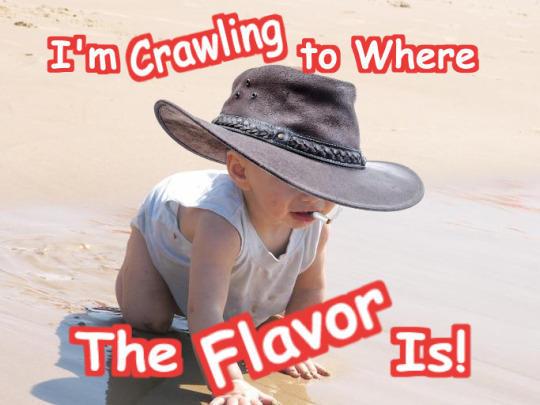
...and such a campaign would make mommies and daddies very upset, so they don't run ads with smoking infants in Highlights magazine.
But a funny thing happens when, all of a sudden, someone smacks themself on the forehead and cries, "Oh no! Babies DO buy Virginia Slims!" Or, more plausibly, "Wait! WOMEN BUY CARS!" Nobody has been marketing to that demographic, there is no playbook to follow, and they scramble for a strategy.
Oh, and it is hilarious watching them trying to figure out what a new demographic wants out of their product.
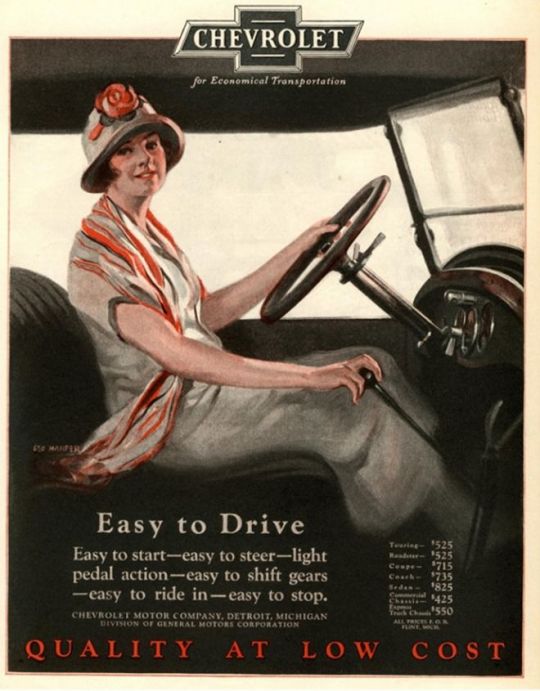

Uhhh... Pinkness and an automatic transmission, you guys? Is that good? Bill, would your wife buy one of these? If you let her, I mean, ha!
Likewise, in Brigitte's early strawberry ad: Uhhh... Glitter! The "tran"s love makeup and glitter! And a relatable, pretty nobody, and donations to worthy causes!
They're still dialing it in. Even poor Dylan up there doesn't seem to have much idea why someone who likes her brand would like a cheap, lite beer. She decided to just be honest and relatable too. "Well, it's nice having my face on a product, and one assumes you drink this while watching a sport...? Ha-ha-ha, this is kinda silly, but I guess they're trying to be nice. Well, anyway, Bud Light exists!"
It's really quite cute. It makes me like HER, but I'm not gonna buy a Bud Light. Likewise, that Gillette commercial was super sweet, but it didn't make me wanna go out and buy a Gillette razor, or anything at all. Conversely, when Goya foods shot their mouth off, I didn't stop buying them. I never started buying them. If they didn't have what I wanted in the store brand, I might have gotten a can or two of Goya, if they were the cheapest. After the beans hit the fan, I quit doing that with no more effort than moving my hand a few inches to one side or the other. No hardship to them and no hardship to me.
Me, and my friends on the left, are not big name-brand fans, or big Capitalism fans. These things are notable as cultural bellwethers - "Ah-ha! Someone did a thing! Now let's see how everyone reacts!" - but not as something we're going to go out of our way to spend money on. We define ourselves by the media we consume much more than the physical products.
The people who market physical products do not know how to handle that. It's kinda freaking them out. That's why we get all those stories about "MILLENNIALS ARE KILLING [THING]!" No, they're just not willing to be ride-or-die with a brand, or even a type. "Hmm, these ciders are all too expensive... How 'bout some box wine?" We don't have the disposable income to be picky, because Capitalism will devour itself for profit as much as anything else.
The throwbacks who are still willing to define themselves via a brand tend to skew right, but they're volatile as hell. Anything that looks like progress or "wokeness" makes them SCREAM. The pundits and politicians like it that way, it keeps them in power - the corporations, not so much. It's getting less and less feasible to be an AMERICAN [or other national identity] brand. There's a culture war in progress - but no matter which side you pick, they will not remain reliable, complacent consumers.
That's why corporate culture is involved in this weird "two steps forward, two steps back" dance. When it's clear who's winning, they'll pick a side. Until then, they're like a bunch a little kids at a party who really want to pick up the pinata candy, except the kid with the blindfold is still staggering around swinging the stick. Meanwhile, the leftists are busy looking for hot dogs in the trash, and the conservatives are screaming, pointing, and throwing more candy on the ground, so they can demonstrate how much they hate the latest evil product.
That last one doesn't make any damn sense, right? Boycotts are rarely effective, and buying more of a thing is not even a boycott. Bud Light will take your money whether you love their beer or hate it. You can throw it at a cop if you want, they just want your money.
Guess what? So do the conservatives. Also, your attention and your validation. That's why they're yelling so loud. All of us need to be heard and seen. All of us perform to show others who we are on the inside. When you film yourself performing and post on social media, though, you can make actual cash. Build enough of a following for your content and Bud Light will show up on your doorstep and offer to put your face on a can!
You're reading this on Tumblr right now, you are at least somewhat aware of how algorithms serve up content, and that the search function will serve you more engagement if you're doing something popular. I already know this post is gonna crash and burn, too, 'cos I don't have a lot of followers and it doesn't involve a fandom. Maybe later the Tumblr goblins will find it and like it, but not for a long while. If I wanted clicks (and I do) I'd give you something on Guardians of the Galaxy, or Spiderverse, or more Kung Fu Panda. If I were branding myself as a conservative gun nut, I'd get a lot of eyeballs on me if I bought a case of Bud and assassinated it right now. I don't want those eyeballs, but some folks sure do.
It's exploitation all the way down and we shouldn't be surprised. People need money to live, and if they have a little extra, they can have fun with it. Bud Light hires themself a trans spokesperson, as an investment, and she needs the money so she does an ad for the beer, and herself. Conservative culture warriors launch themselves at this latest target, every one of them also doing an ad - for themselves and their entertaining and justified outrage. And the platforms that host them rake in engagement from both sides, and more money. All that commerce, all that profit, all that potential, springs from the body of one trans influencer who likes to purchase goods and services - as one does.
In this instance, the beer people freaked out and spent a lot more money taking two steps back. It ain't always gonna be like that - and the next folks who want money from the trans demographic will have some valuable marketing data for the future - but we'll have to wait and see.
Now, I did say this was a silly topic that could end civilization as we know it if we don't handle it right, so picture some scary music right here. There is a market for grinning white faces who shoot guns at "wokeness," and the people with grinning white faces and guns know that, as do the platforms that host them. They make money for the platform and the platform makes money for them. Without intervention, this is a closed circle that only requires a new, popular thing to be mad about, and they can manufacture those at will. Violence and outrage are becoming a commodity, and people are already buying it.
It's popular to be mad at trans folks right now, but "woke" can be anything. They do not actually care what they are mad about, or what anyone who consumes their content does with that anger, they just want your money (clicks, attention, data, etc). Say what you will of the stochastic terrorism of the past, at least it had a political agenda. A privileged politician isn't going to turn on you nearly as fast as a social-media-climber looking for clout. Do you think you're stealth, invisible, acceptable? Do you wanna find out what happens if suddenly you're not?
Regulation and deplatforming are the only way to keep the outrage machine from eating up real human lives. But we are not asking sociologists or internet scholars or anyone who might have a clue to regulate anything. Regulation is something politicians do, and I wouldn't trust any of 'em to set up a wireless printer. As for deplatforming, for now, that's in the hands of the platforms, and they just want your money.
I'm just talking about one potential brand of annihilation, here. Capitalism will sell us everything we need to destroy ourselves, for as high a price as the market will bear. It doesn't care.
If we want it to stop, we have to care enough to apply the brakes. Ai-yi-yi, but I know we've already been trying, and we're not getting much traction.
Better get yourself one o' them pink cars with the automatic transmission, and buckle in.
#brigitte empire#marketing#capitalism#violence and outrage as a commodity#got a couple vintage car ads for the ladies too#i drank prosecco and sugar and wrote a thing#woo#i didn't say anheuser-busch or whatever because bellinis and i don't wanna copy and paste to spell#i don't like beer but that's not even a good beer if you do like beer right?#if your beer ain't good enough for people with no taste buds who like beer you done fucked up#Youtube#edited in the morning because it needed a marlboro baby
4 notes
·
View notes
Note
ehhhhh. yes and no. this supposes that you are going to have shame about not being able to do stuff, and that you are going to BE shamed for that. it requires that you are going to be treated badly, and that this is the difference between laziness and sickness.
you do not have to have shame for being sick. for being disabled. you do not need to be shamed or feel shame for being unable to do things. that should not be a standard part of society. people who don’t feel shame aren’t faking it. they should not feel shame, that is the appropriate and healthy reaction. however, society being what it is, the average person is going to be shamed and feel shame when running up against tasks their disability prevents them from doing.
overall, objectively false but contextually true.
however however.
the idea that you are in the right if you feel bad is also not correct. lots of people who have done shitty things feel shame and thereby think they are the ones in the right. all that shame means is that you think other people will judge you or treat you badly for it. nasty people full well know they’re going to be treated badly if people find out what they’re doing. you feel shame about being disabled because you know other people will treat you badly for failing at simple tasks. that doesn’t mean you’re really disabled, that means you know that not doing it is going to get you in trouble. just like the kid who plays baseball in the house and breaks stuff, feeling like shit about it doesn’t mean he was right to play and to break stuff, it means he knows he’s going to get beaten for it (he should not be getting beaten!). people who have same sex sexual relations feel shame about “being gay”, not because being straight is morally superior or because they’re incapable of being straight and thus "truly gay", but because they know violent bigots exist. people should be allowed to experiment with gayness whether or not they have innate sexual orientation, much like people can experiment with fashion without needing to claim "innate gothness" beforehand.
how other people treat you, and your reaction to that, does not define the morality of an action.
that people repeat this adage about shame as a moral truth serum ought to show us that our moral judgement rests solely on whether people feel good and righteous about what they’re doing, not on any thought about the action itself. we think feeling bad means we’re doing the right thing, we say “oh i wish i didn’t have to hurt you” and that’s all the justification we need: no further thought necessary. whelp, that’s shame so whoever you’re hurting for whatever reason, you must be in the right! that’s all it takes to justify something like that. we investigated ourselves and we found no wrongdoing, so we’re good to go! like. what, the fuck. surely we see some massive errors in this lack of a process.
and yet if we see someone visibly questioning themselves, we treat them like incompetent trash. what batshit behavior?? which should tell you that it's not "feeling shame" but merely the thought, "should i do this? yes" that people are using to rubber stamp themselves clean. even the most vile of people are gonna have second thoughts because wondering is a natural act.
I first read “if you were lazy you would be having fun” on your blog and it has genuinely been a life-changing piece of advice for me and my friends - I’ve said it to like four of my other executive dysfunction judies and without fail it earns a ten second silence followed by a single revelatory “fuck”
My dad and I actually ran into the speech language pathologist who told me that over 20 years ago at a town hall a few months back—she is retired now, but still advocating for disabled students at IEP meetings and being a nuisance to school administrators. I thanked her for everything, and she was delighted to hear that I was passing her words along to other people who needed to hear them!
33K notes
·
View notes
Text
Easily the most embrassing thing about the fact that LaVeyan Satanists (or any Satanist to be found in "the libertarian right") base even part of their worldview on Ayn Rand is actually just the fact that Rand herself was, above all else, a moralist. Yes, Rand and her followers did indeed espouse "selfishness" as a virtue, but the only way they could bring themselves to do it is within the framework of what is essentially moralism. Think about the fact that the Randians/Objectivists constantly feel the need to define themselves against the idea that individualism means "I do what I want", and constantly feel the need to define themselves against thinkers like Nietzsche or Stirner. Rand in fact opposed Nietzschean egoism because she thought it was "subjectivism" and that it interpreted any action as "good" if it was meant to satisfy one's own desires, and naturally favoured "Apollonian rationality" over the Dionysian principle.
There's also an essay called Counterfeit Individualism, which was written by Nathaniel Branden and published by Ayn Rand, in which Branden opposed Nietzschean and Stirnerian egoisms while actually claiming that "altruists and collectivists" want people to think of egoism as "doing what I want" in order to control them. Instead, of course, Branden argues that individualism must be based on a rational ethical principle based on moral rights. The thing you have internalise from all of this is that Randian philosophy is, fundamentally, and above all else, a species of moralism. Realise that, and you will become aware that the standard objections to Rand and Randian philosophy actually fail to understand this aspect, and thus fail to understand the nightmare of capitalist austerity as the product of moralistic and ascetic accumulation.
It is exactly this ascetic morality of accumulation - which, if you think about it, isn't at all divorced from Kantian morality or Protestant Christianity - that is the real nature of how Rand and her followers define "selfishness". Of course, the implications should be rather embarassing for the Church of Satan and really any Satanist still following LaVey's example on Rand. Simply put, basing your Satanism on Rand is nothing more than a concession to the ascetic morality of Christian rationalism.
But the evasion of this fact is not only a product of ignorance. It also helps to preserve the dominant moralistic worldview, in which egoism must be always subordinated to the will of society, and therefore the control that societies can exert over individuals. Needless to say, progressives are entirely complicit in this project, by refusing to locate the affects of Randian capitalism as products of Randian morality in favour of recourse to libidinal greed and thus abstract "selfishness" (and therefore ontological evil). In reality, capitalist austerity has always regarded expenditure as an ideological and moral failure, for the same reason that Christians denied the satisfaction of the sex prnciple and the same basic reason that Kant argued that pleasure should be suspended by reason. The Objectivist concept of "altruism" is really nothing more than expenditure, and there's nothing unselfish about expenditure.
Bottom line: Rand and the Objectivists are simply moralists who want to be selfish, want to be egoists, and actually believe that they are selfish individualists who have broken free from the slave morality of society, when really they have failed to be egoistic because they have failed to break away from the confines of morality. Rand was always nothing more than someone who needed permission to be selfish or to be an egoist, and the difference is that, instead of the authority of God, she requires the authority of Reason. This is the primary difference between Randians and Christians, besides the sheer blinding arrogance of the Objectivists.
1 note
·
View note
Text
multigender family relationships. right? what’s up with that?
mom goes thrifting with her daughter, it’s their special thing; but when she’s her son, they can’t leave the house, not with her- him- YOU looking like that. what if some well-meaning stranger asks what THEY’RE having? what if the cashier can’t parse “ma’am” from the possibility of “sir” and stammers and decides on saying nothing?
dad never wanted daughters. it’s hard to tell if he ever wanted children; in his typical fashion, he’ll neither confirm nor deny. it kinda of reads as both: you’re right, no, i never wanted kids, but hey, your mother did. dad thinks womanhood is a disability. to have a daughter grow up to experience womanhood and disability as separate things and without taking that view is reprehensible; to have a son grow up to view disability and womanhood as morally-neutral things, while experiencing both as well, even more so. and it doesn’t help that they’re the same person.
i spent so long trying and failing to be my sister’s brother that i didn’t get to be her sister, too. i am my sibling’s sibling, and their brother, and their sister, and it must get overwhelming, because i’m three-fold and spread out all over, and they’re one person concentrated, defined, straightforward and with measured, deadly accuracy. i couldn’t be the cool older sister or slacker over brother because i grew up over-exerting myself, studying subjects they weren’t even teaching in school, trying to be the best at something so i’d finally have a label that wasn’t gender to define me: stand-out star of the high school drama club, most valuable player in gym class, the only saxophonist, like, there, i guess. when my rental was up and i had to give the saxophone back, it was like giving back my voice - and i was never even good, i was just good at using it as a prop to hide behind. “yeah, i’m related to- yeah, the saxophonist, you got it. infamous, huh?”
i couldn’t be the cool older sister or brother because i was too busy struggling against my body; i’m not a sister because of my body, not a brother in spite of it, but i didn’t have the words for that yet, and i opened other things instead of my mouth to try and test them out. i missed out on connection because i was flailing, and doing it in a way that gave way to a threefold person. “will you always be like this?” a little. and i’m sorry i let my mental health get in the way, because we could’ve really connected, again and again and again…
i’m your nephew and your niece, and i’m tired of you talking about my insecurities in public; yes, they fluctuate from day to do, yes, you’re really good at figuring them out, no, the waiter DOESNT need to know i’m insecure about my chest but not my nose, actually. i’m your grandson and your granddaughter and maybe it’s okay that i gained some weight in college; i was your granddaughter when i was starving myself to be worthy of being your grandson, too.
my family’s big, i could go on forever. i shouldn’t, though. this isn’t queer theory, like i wanted it to be, this is just one multigender person struggling through a funhouse mirrors’ worth of duality. when i go home tonight, i’ll wave to my sister; she’ll wave back; i won’t know who she’s waving to or how much she knows, or how much i have to do to repair our relationship. i won’t talk to my dad; he won’t register me at all, which is as close to agender as i’ll ever get - invisibility. the absence of gender through the absence of being. doesn’t sound all that bad, sometimes. i’ll plan on ways to get my sibling and me outta this small town; i want my sister to come, i don’t know what they think. we’re all at different points in our lives and careers, i’ve spent all my worth and promise and it’s unfair of me to drag two people down when only one has been generous enough to consent to it thus far.
and i’ll hug my mom, and she’ll hug her daughter. but never her child, and never her son.
1 note
·
View note
Text

The Lost Virtue - Piety
It is a terrible thing to lose a virtue. We need all the virtues to be a fully moral person just as we need all the parts of the body to be working properly if we are to be in full health. If certain muscles in the legs do not work, for example, we may limp. If a person lacks the virtue of charity, all his other virtues are in vain. Unfortunately, it is very difficult to recover a virtue once it is lost.
The virtue to which I am referring is piety. If it is used at all these days, it has been watered down to a rather sentimental form of religion. Hence, it is commonly seen not as a virtue, but more as a vice. The road to its recovery is fraught with many obstacles.
The word piety is derived from the Latin word, pietas, the noun form of the adjective “pious,” which means “devout” or “dutiful.” Virgil refers to Aeneas at the fall of Troy, as “pious Aeneas” for carrying his father, the lame Anchises, to safety. Aquinas cites Cicero who stated that piety “gives both duty and homage,” “duty” referring to service, “homage” referring to reverence or honor. Pope Saint John Paul II defined piety as “the gift of reverence for what comes from God.”
A German translator, in an attempt to provide a word that would restore the notion of piety to its fullness, coined the word Blutpflichtverbundenheit. The word never caught on, but it does represent the essence of the word “piety.” Literally, it means “blood-duty-connectedness.” Where there is a blood connection (within the family), there over-rides a duty connection. We are not alienated from our ancestry, but bound by blood to honor and respect them. By the same token, we should respect all the good things we have received from the past.
When we observe the contemporary scene we see a disrespect for tradition. The term “presentism” has been coined meaning that everything in the past should be judged by the moral standards of the present. Yet these standards are most unimpressive: abortion, euthanasia, the LGBT agenda, same-sex marriage, the disintegration of the family, the vandalizing of churches and the destruction of religious icons. The absence of piety, a respect for the good things of the past, creates a moral void that is filled in by the delusion that the present generation is the measure of everything else.
The critical importance of tradition has been accurately and dramatically symbolized by the first Broadway musical to surpass 3,000 performances. Without tradition, Tevya explains in “Fiddler on the Roof,” we do not know what is expected of us, and thus we become as vulnerable as a fiddle precariously perched on a roof.
Tradition is foundational. It is our platform and our launching pad. It provides the momentum that allows us to go forward with knowledge, wisdom, and a secure footing. We cannot plant our feet in mid-air. We draw from the good things of the past so that we can be better prepared for the future. The past is our life-blood that will ultimately serve the future.
Our exaggerated belief in progress has distracted us from the glories of the past. And, despite all its flaws, there has been glory, in law, medicine, technology, and human rights.
Piety opens our eyes and hearts to the wealth that we have inherited. It leads to appreciation, gratitude, and our own enrichment. In the absence of piety, we deprive ourselves of this wealth while failing to see the flaws in which we are immersed. The Catholic tradition comes alive when we view it through the virtue of piety.
6 notes
·
View notes
Text
On Boschlow, Skarlow and imaginary moral superiority
Alright, before anyone wants to yell at me for putting this in the ship tags, this is less an “anti ship”-post and more of an “I want to have this conversation with shippers because I think it’s important to talk about this”-post.
So, Boschlow has always been a fairly popular ship in the fandom, which doesn’t really surprise me, because the whole bully/victim dynamic is just incredibly popular, no matter which fandom you enter.
As a person that got bullied throughout the majority of my high school years, I have thoughts about this dynamic being so popular in general, but that’s not what we’re here to discuss today.
Recently, there has been an increasing number of Skarlow shippers making art and writing fics.
What makes this so different from Boschlow?
Essentially... nothing, and that’s exactly why I felt the need to make a post about this.
I’ve seen a bunch of Skarlow shippers say they do not ship Boschlow because Boscha is an awful person, putting themselves above the Boschlow shippers and making Skarlow a “superior” dynamic, based on... what, exactly?
From my perspective, there’s exactly two things Skara has on Boscha when it comes to shipping her with Willow. One being, she hasn’t thrown trash on her—which is an incredibly low bar to set.
The other thing? Skara acknowledged Willow’s Grudgby skills at the end of WILW.
And that’s a scene that gets misinterpreted a lot. See, people take Skara being nice to Willow here as a sign that she’s a way better person than Boscha, that she’s changed, and so on and so forth.
But this is untrue.
What exactly is it that changes between the beginning of WILW and the ending of the episode, between Willow and Skara specifically? It’s that Skara has seen Willow is good at Grudgby. Grudgby is something of value to Skara, thus, Willow’s skills impressing her makes Willow someone worthy of being treated well.
The ending of the Grudgby episode isn’t everyone except Boscha suddenly magically being better people. They’re all still very much bullies. They’re just now seeing Willow as someone who is better than other people because of her skills—and should therefore be treated better.
Boscha isn’t as willing to share her imaginary pedestal with Willow. But that’s the only difference. All the Grudgby girls are currently still on that pedestal. They’re just seeing Willow as someone worth sharing it with now. If they saw someone being “weak” the way they thought Willow to be previously to the match, they’d bully that person the same way they did Willow.
This isn’t any of them being better. This is all of them behaving the same way they always have. Willow is just moving up in their social hierarchy.
It shouldn’t take being good at some magical sport, or being a talented witch, or whatever the heck, to decide not to bully someone. NOBODY deserves to be bullied. Even the weakest, least sporty witch of the Boiling Isles should be treated with the same amount of respect as any of their classmates. Your value as a person shouldn’t be defined by how good you are at something. You have value no matter what you are and aren’t good at. And that’s something Skara and the others still fail to acknowledge.
Also I think it’s worth noting that even when they were treating Willow better at the end of the episode, they didn’t go out of their way to apologize for how they’d treated her before. They acknowledged her skills and don’t at all comment on how they treated her previously to the match.
If it takes some huge effort from Willow and her friends for the Grudgby girls to treat her with even an ounce of respect, that’s not character development. Character development would be them changing their general behavior. Acknowledging the way they’ve treated others was shitty, apologizing for that and actually working on being better. Is there a possibility this might happen? Sure. But you guys basically pretend WILW is their redemption arc already fully done. You’re giving Skara and the others credit for something that currently haven’t even happened.
And the option of them ditching Boscha (which also currently hasn’t happened) wouldn’t be a redemption arc either, even if it could be part of one.
Cutting toxic people out of your life can help, but Amity’s redemption arc was that, plus her explaining herself to Willow and giving Willow time, and actually acting on her word of not letting her friends pick on her again. Amity making it up to Willow wasn’t that she cut out Boscha and Skara. It was that she not only promised to be better but acted accordingly, standing at Willow’s side when she needed her.
(And Skara not constantly being a dipshit when she’s in the background is not a valid argument for why she’s a better person than Boscha. Boscha is also a harmless character when the episode isn’t focused on her, e.g. in Covention & Sense and Insensitivity. That Skara isn’t actively bullying her friends—which, uh, most people like their friends? This shouldn’t be that surprising?—is not a thing that should earn her any points in being “nicer” than Boscha.)
Do I think it might be a bit easier to get through to Skara than Boscha when it comes to letting go of current behaviors? Possibly.
From the way their characters are written and with how Boscha refuses to acknowledge Willow as equal even after the Grudgby match, it’s fairly obvious that it would need some pretty major event to get through to her. There’s an extra step here with Boscha (needing to learn to acknowledge others as having equal value to herself) that Skara doesn’t need to take.
BUT that one step in what should be a fairly long journey for either of them is far from enough to justify one ship being better than the other.
From the way I’ve seen it written (and unfortunately also experienced it in the comment section of my own fic), a bunch of skarlow shippers like to excuse Skara’s behavior by entirely pinning it on Boscha, pretending she’s actually a great person and that it’s only her friendship with Boscha that makes her toxic—and also that Boscha is the only one that should be held accountable for everyone’s behavior.
I am not exaggerating, I got a comment that essentially said “this shows wonderfully that Amelia and Skara are actually good people that unfortunately met a horrible person that had too much control over them.”
This strips Skara and Amelia of any accountability for their actions. And the idea of Boscha being an evil mastermind that forced all her friends into doing things they never wanted is... quite frankly, stupid, and also untrue. Skara actively encourages Boscha making fun of Willow at the beginning of Understanding Willow:
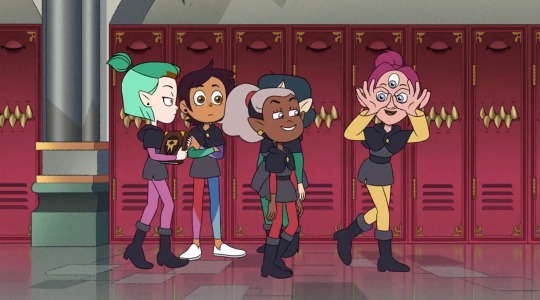
In the same episode it’s also stated that Amity “let her new friends bully [Willow] for years”, which definitely includes Skara and isn’t just about Boscha.
Skara looks really pleased when Boscha takes Willow’s hair clip at the beginning of WILW, just appears bored and not at all sympathetic when she throws gum at Willow, and grins gleefully when Boscha suggests using the others as target practice later in the episode:
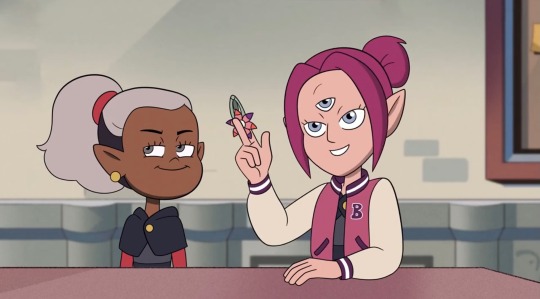
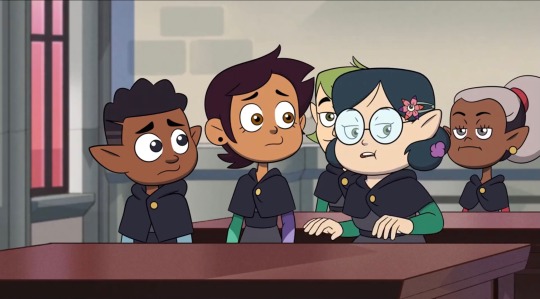
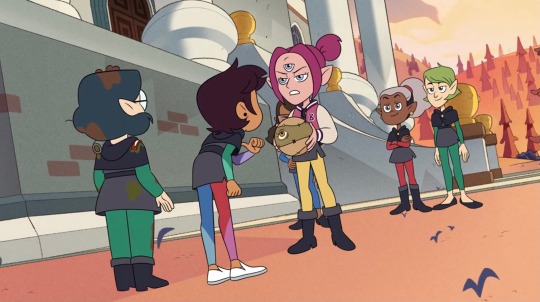
Also, in Once Upon A Swap, Boscha’s entire squad is messing with people all over Bonesborough. Skara is throwing monster balloons at the city when Boscha isn’t even present:
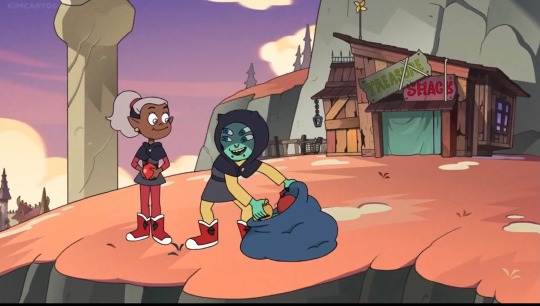
Not only that, but a very large portion of the episode has Skara and the others literally ditch Boscha in favor of an even meaner person (King in Luz’s body).
King states, and I quote, “Hey, impressionable youths! Under my command, you could learn how to do some real damage.” after unleashing a monster on the city. And the entire group cheers him on and decides to follow him.
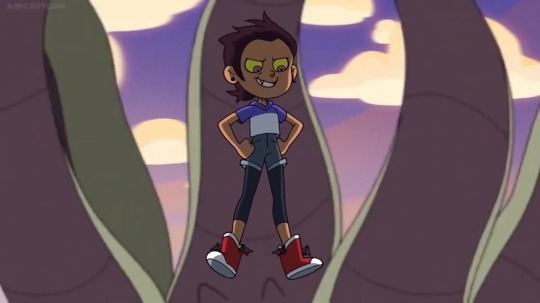
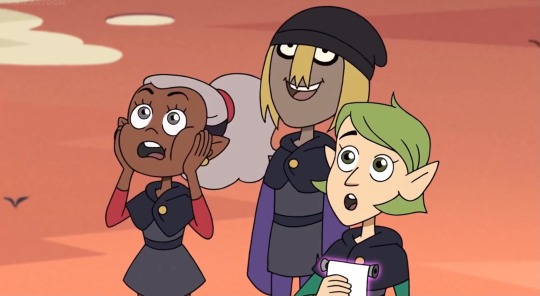
If Skara was actually so much better than Boscha, why the heck would she run after someone that is worse than her when given the opportunity?
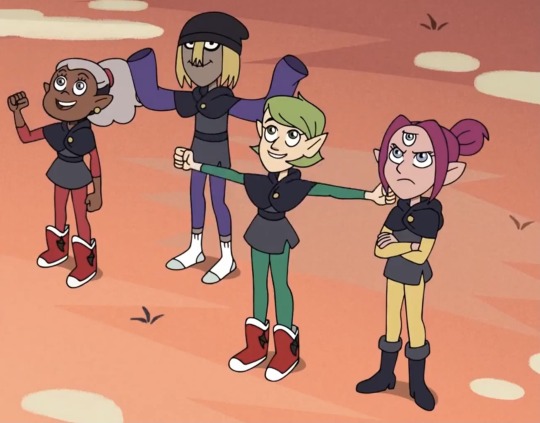
And here comes the thing that a lot of the Skarlow shippers refuse to acknowledge because they for some reason feel the need to have moral superiority over Boschlow shippers: Skara isn’t a nice girl. Skara is a bully. And Skara should be held accountable for her actions in the same way as Boscha. Saying everything she did was just Boscha forcing her is entirely untrue to canon and just a lame excuse to make your ship look better.
Boscha and Skara have both bullied Willow for several years. If you want to ship either of them with her, even if you just want one of them to be friends with her, that needs to be acknowledged and definitely not excused. Even if you treat Skara’s bullying of Willow as something she did only due to Boscha (which, again, is canonically complete nonsense), she’s still hurt Willow to pretty much the same extent as Boscha has.
That a person isn’t as into the bullying as someone else doesn’t make it hurt any less for the victim of the bullying.
No matter if you ship Skarlow or Boschlow, commit to the reality that Skara and Boscha are both Willow’s bullies. Quit pretending Skara is so much better than Boscha, or that she isn’t responsible for her actions.
She is just as responsible for bullying Willow for years as Boscha is.
I’m so sick of hearing how Skara’s bullying is far more redeemable than Boscha’s. It’s not. Stop declaring bullying that doesn’t get physical harmless. As someone who was “only” ever verbally bullied, let me tell you that after four years of not seeing that person I’m still scarred by it. Stop getting your head so stuck in high school movies. Just because not every kind of bullying involves someone getting shoved into a locker doesn’t mean it’s not harmful.
Even worse: the take that people are shipping Skarlow “because they realized shipping Willow with Boscha is inherently toxic”. Tell me again why this “revolutionary” movement deciding that Willow deserves better then turns around and ships her with another one of her bullies?
This isn’t about treating Willow better. You’re just making Boscha seem unreasonably evil for no reason, and treating Skara as her not at all responsible victim, so you can ship Willow with her and don’t have to acknowledge that Willow is a victim of both of their bullying.
This needs to stop. Skara needs to be held just as accountable as Boscha.
If a Skarlow shipper exclusively comes from a perspective of “I think their personalities would mix better”? Sure, whatever, they may or may not, but that’s a valid opinion to have. But don’t start shipping Skarlow because you think you’re being better to Willow than the Boschlow shippers.
This whole thing isn’t a movement to get Willow a better girlfriend, lol
Both of them bullied her. Both ships are bully/victim dynamics. Skarlow does not actually have any moral superiority over Boschlow. As much as you refuse to acknowledge this, these two ships share the same basic dynamic.
Stop pretending shipping Willow with one of her bullies is leagues better than shipping her with another.
#also I wanna clarify I don’t think either character is irredeemable?#they’re fourteen year old kids of course they can change and shouldn’t be treated as irredeemable monsters#but like. stop pretending Skara already had her redemption when it didn’t happen#Willow park#the owl house#toh#skarlow#Boschlow#Skara x Willow#Boscha x Willow#owl house#toh Boscha#the owl house Boscha#toh Skara#the owl house Skara#FanFiction#fanart#toh fanart#toh fanfic#toh fandom#owl house fandom#toh Willow#this has been a PSA by a bullied person thank you for reading#reblogs are very appreciated because the more people see this the better#eleena rants#rant#long post#bullying TW#look at me being controversial on main again lol
274 notes
·
View notes
Text
What Does It Mean to Save?
I keep seeing it said that Deku, Ochaco, and Shouto will “save” Shigaraki, Himiko, and Dabi, but that there will be no redemption and/or no survival for them. I’m truly not trying to vague these posts and everyone is entitled to their opinion, but literary criticism is fundamentally responsive so I’m writing this anyways.
I personally think that’s not BNHA’s definition of saving nor of redemption. So here, have a deep dive into literary tropes related to redemption, genre, and character arcs as they pertain to BNHA and the question of: what does it mean to save Shigaraki, Touya, and Himiko?
Before we begin, let me say that while we might be personally uncomfortable with redemption (there’s a redemption arc in BNHA I am personally quite uncomfortable with), that doesn’t inherently mean the narrative won’t go there. The key principle I’m operating on here is BNHA’s message that heroes save people. It’s held up as the highest ideal.

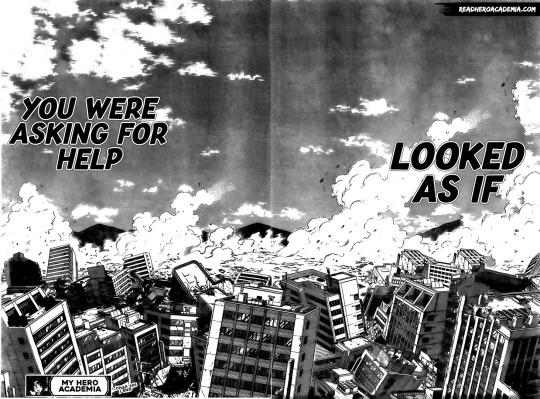
So let’s talk redemption in BNHA-verse. With this guy, whose redemption arc I dislike in principle but accept as part of the story so don’t come for me stans and/or antis. I’m analyzing because it shows us what redemption means in BNHA-verse, whether or not that is satisfying to you personally as it fits/does not fit with your own morality/philosophy.
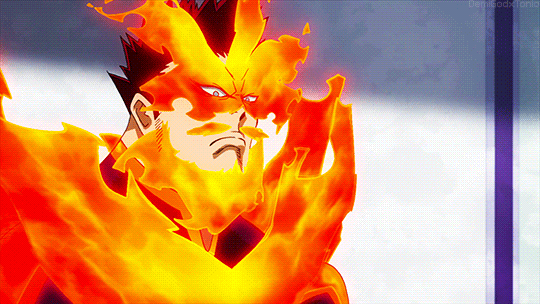
If Endeavor can be redeemed and live, and he’s Bakugou’s negative foil, I highly doubt Shigaraki and Deku as well as Touya and Shouto and Ochaco and Himiko will be any different. Why? Because Enji is an adult character. The others--well, Himiko’s age we don’t know, but we do know that Shigaraki and Dabi are technically adults. But does the story consider them adults?
(It doesn’t.)
Child-coded characters are generally more likely to survive a redemption, which I’ll explain more later. First I have to define what I mean by child-coding, because I DO NOT mean this in the way it’s often (mis)used in fandom wank. Child-coding is a real thing, but it is not done to infantilize and it has nothing to do with shipping.
Child coding frames the character as a child for a few narrative purposes to convey a story’s theme or purpose. For example, if it’s a coming of age story coding a character as a child even if they legally are not emphasizes their journey to an understanding of self-actualization, or a true understanding of self with self-awareness and an understanding of self-value. An example of an adult coded as a child is The Kite Runner, wherein Amir is a legal adult for half the story, even married for fifteen years so we’re talking 30s-40s, but he does not truly become an adult until he returns to his homeland and takes responsibility for a childhood sin. In Attack on Titan, the main characters are now nineteen, but are still struggling to take responsibility as adults and have only started doing so now that their mentors/parental figures have started dying.
Along those lines, in any kind of story, you can code a character as a child of someone, regardless of biological relationship, to convey the type of relationship they have (usually a mentor one). For an example of this, see Bungo Stray Dogs’ Dazai and Akutagawa. Despite their two year age difference, Dazai recruited him to the mafia, abandoned him, and Akutagawa desperately seeks his approval. Usually in these stories a character will “overcome” their parental figure. This can be done through overcoming their need for the parental figure’s approval in stories where the parental figure is kindly (such as in Harry Potter, when in the final book Harry, Ron, and Hermione leave the Weasleys to find the Horcruxes despite Mrs. Weasley’s please) or through like, killing/stopping/leaving the parental figure when they are abusive (see fairy tales like Rapunzel and Cinderella). The parental link to self-actualization is because it is childlike (and a part of actual psychology that is reflected in literature) to see yourself as a part of your parent; self-actualized person would see yourself as a distinct person from your parent, but also acknowledge the ways in which they’ve shaped you.
So, how do you code a character as a child? BNHA isn’t subtle about it, because Horikoshi seldom is subtle about anything. The villain trio are all coded as children.
Shigaraki Tomura:


Who cannot achieve self-actualization so long as AFO has access to his body, as he’s literally trying to possess him. He’s trying, but it’s not gonna work because Shigaraki can’t keep AFO and become an adult at the same time. It’s a choice the narrative is setting up: your dream of destroying, or your freedom? (To get the latter, he’ll probably have to destroy AFO).
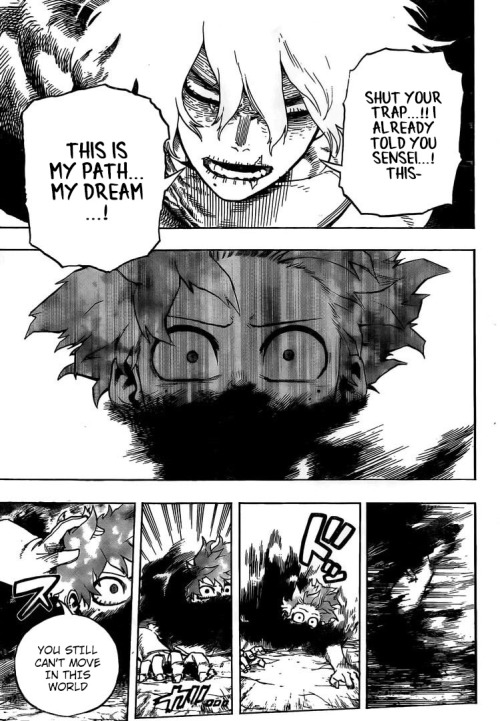
Todoroki Touya, who is repeatedly emphasized as a small child when compared to his siblings, and yes, I know he’s now tall. Specifically he’s spotlighted as the child of Endeavor:
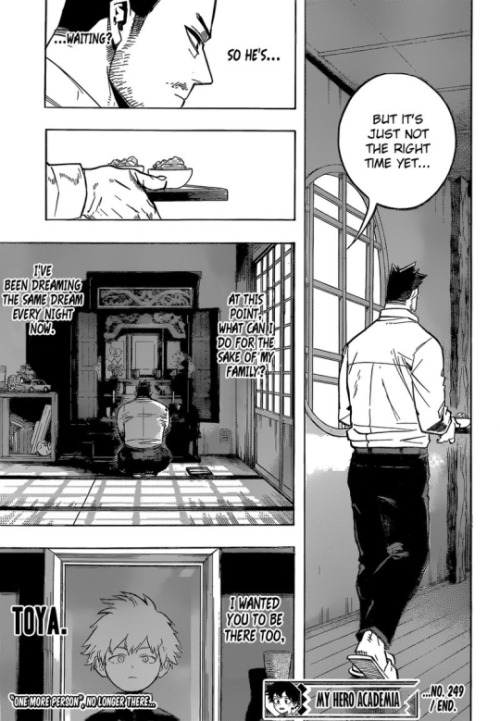

And he’s the least self-actualized one in a lot of ways, contradicting himself constantly. I’m not Endeavor, DUH! But these are Endeavor’s flames! He’s gonna have to choose one or the other, because the tragic irony is that the more he takes out his rage on those around him, the more like Endeavor he becomes.
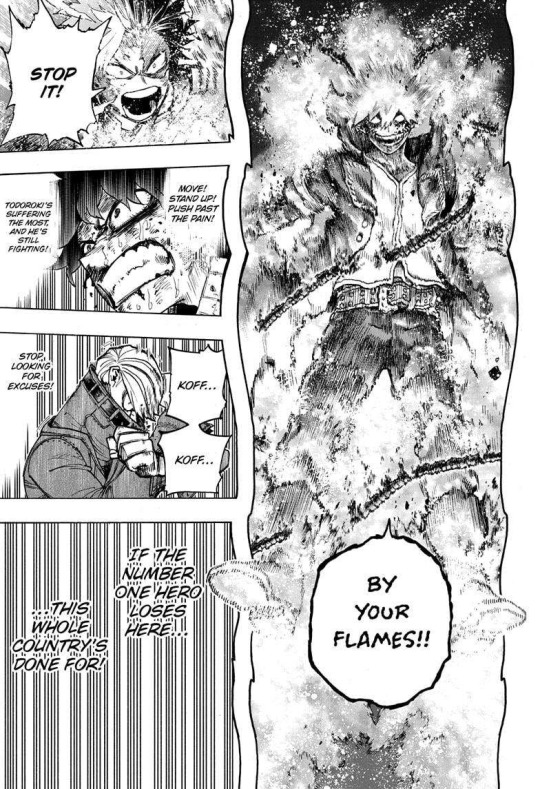

And Toga Himiko (who might well literally be a legal child), who is actually the most self-actualized one thus far, because she rejects Curious’s child insistence (Curious holds her in a Pieta pose, based on Michelangelo’s statue wherein Mary holds a deceased Christ):

She’s still got, like, a way to go though:

Because Himiko also wants to be like the people she loves to the point where she loses her own identity in them, which is er, not self-actualization. So she’ll have to choose whether or not she really wants to be like the people she loves or whether she wants to live her own way, which she herself tells us how that would end (death):

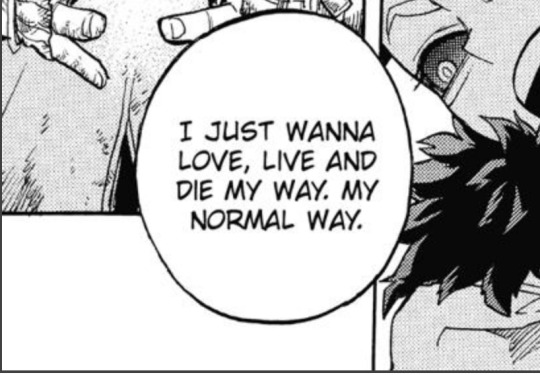
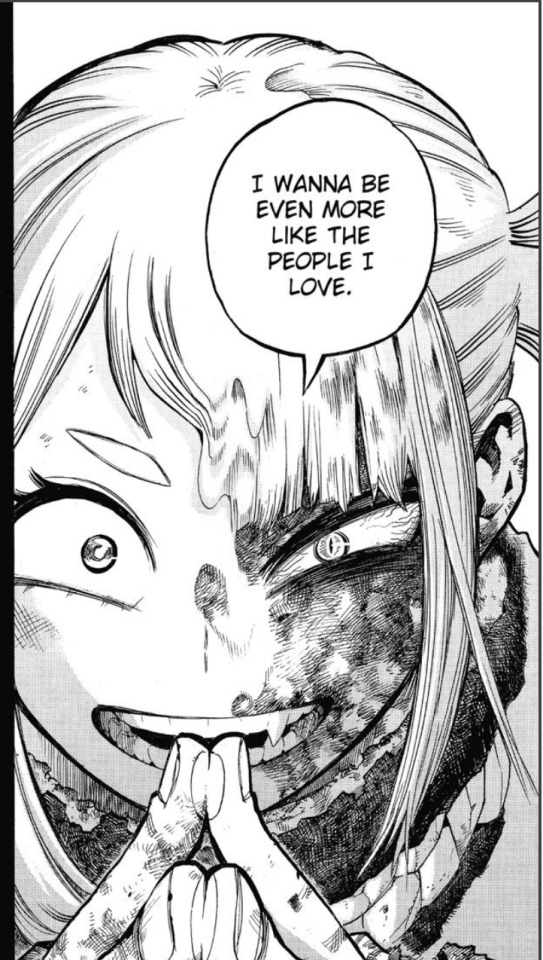
Deku said it himself: it’s good to focus on what someone is doing now. And look, I have issues with this statement and how it’s framed. I’ve talked about it at length and it was doomed to fail because Shouto himself told us long ago that it was annoying to hear a righteous speech by a stranger when you hadn’t gone through the same, plus Endeavor kinda failed by choosing being a hero over a dad here. But, the principle is that if the past doesn’t preclude Endeavor from seeking a better self, why would it preclude three characters coded as children, one of whom is literally somewhat the product of Endeavor’s sins? BNHA doesn’t think the past keeps someone from a better future.
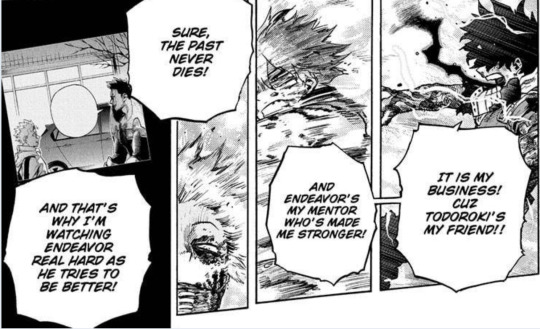
So what about Dabi’s counterpoint, which is indeed valid? Well, redemption doesn’t mean the past forgets, either. It’s complicated and nuanced, and we can debate how well Horikoshi strikes this nuance (it’s got its flaws), and admittedly I don’t know how this will go down in the future. But it is asking Endeavor: how do you redeem yourself to the people you’ve hurt? And we have Endeavor asking this question to Touya’s shrine. I mean, the foreshadowing is obvious. Endeavor has to redeem himself by trying to save Touya. However, it will still probably come down to Shouto to save Touya.

For our three villains, it’s a little harder to predict... well, sort of. For Shigaraki it’s extremely obvious: he has to help take down AFO. Dabi probably has to do something to help his family (siblings probably), but it’s vague. Toga needs help and not condemnation, but presumably she’ll help Ochaco with something.
So, is this redemption? I’d define it as redemption in the eyes of the narrative. To address what makes a redemption is another essay unto itself, but if we bring in the oft-compared Star Wars example: did Darth Vader get a redemption? Did Ben Solo? Everyone says yes to both. However, only Luke witnesses Vader’s redemption, and only Rey Ben Solo’s. So the rest of the galaxy? Doesn’t think so. When I say they’ll be redeemed, I’m defining it as their role in the eyes of the narrative, not whether or not society will accept them or even whether their victims will forgive them (of note, in canonical novels, Leia never forgave Darth Vader despite learning he was her father and obviously knowing Luke’s account of his redemption was true).
So, redemption in a narrative doesn’t mean all of society has to forgive and accept them. Dabi has still like, murdered 30 people--many of whom were thugs, but he himself acknowledges they didn’t deserve to die. Additionally, he himself also acknowledges that the families left behind--their feelings matter:
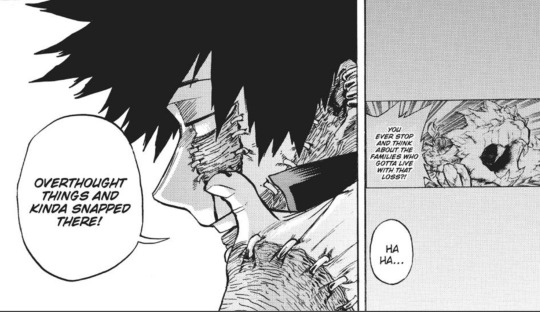
But why does that mean they have to die? Why even does it mean they have to languish in prison forever? (If there’s even a safe prison at the end of BNHA which I kinda have doubts about.) Heroes have also killed: see Hawks as Exhibit A. In fact, some people want revenge on the heroes precisely because they arrested or killed their loved ones (jail isn’t held up as a rehabilitative place in BNHA’s world. In most countries it isn’t in real life, either, but again that’s for another essay). So why don’t the League’s feelings on Twice’s death matter just as much as the feelings of unnamed and unseen (and thereby less important narratively) characters?
Additionally, regarding death... the villains routinely get called on their death wishes. Himiko’s determination to decide how/when she dies is called out because this is right before Twice overcomes his trauma to save her, and the next arc they appear in is when Twice dies trying to save her again. Dabi’s suicide wish keeps him from getting close to others, and it keeps getting thwarted. Shigaraki’s obsession with destruction and death is clearly not a good thing, and his rejection of his family’s desire for them to join him in death this past arc is growth.
In other words: what Dabi said and what Snatch said about families and how they feel matter for the villains too. The villains are their own weird found family (Dabi as the deadbeat prodigal brother of both his families). Their deaths--Magne’s and Twice’s thus far, and I’m not ruling out further deaths in the future--affect the others. People’s feelings on losing loved ones matter. The villains are people, as Himiko said herself this arc:
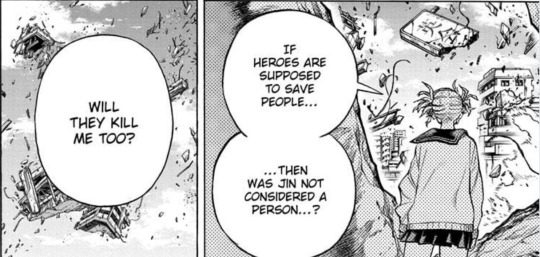
Their feelings about each other matter:
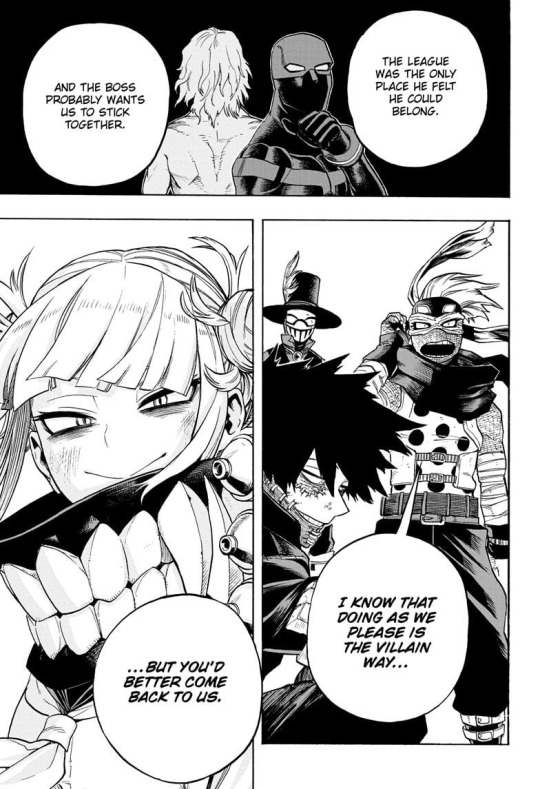
How would Touya dying affect the Todorokis? At least they saved him spiritually, I guess, but that’s absolutely lame narratively, and if you have Enji eventually do a sacrifice to save Dabi (pretty likely, even if I personally think Enji will survive said sacrifice) then what’s the point of Dabi dying? How would Himiko dying affect society? As a martyr like Curious wanted her to be, even a redeemed one? A tragic warning story? What even is the point of Ochaco saving her if that’s the case? If Shigaraki dies, well, who would mourn besides Deku? How would Shigaraki dying affect the surviving members of the league? He just couldn’t be saved physically?
It’s not impossible some of this happens, but it doesn’t seem like great writing, especially with panels like, oh, these that show us BNHA’s perspective on death:
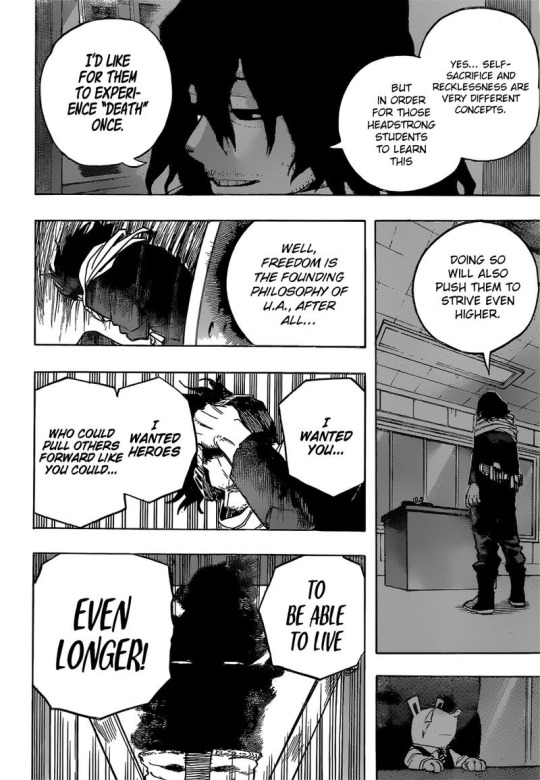
Sacrificing something is a type of death that occurs in stories; this should happen in a redemption arc, which is why I’ve been saying Enji needs to sacrifice his hero reputation to help save Touya and even then it’ll still be Shouto imo who does the saving. But physical death?

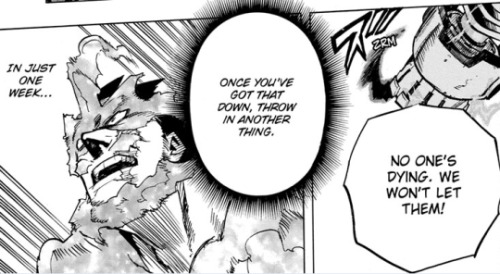
If you want further analysis of the latter two panels and how they relate to the ending, see here.
We already have another villain who will definitely die redemptively (Kurogiri--an adult coded character--because he’s already, like, dead), and Spinner and Mr. Compress aren’t coded as kids so I hold them with anxiety towards the end. But again, this isn’t me being ageist or saying this is the way things ought to be in fiction or real life: it’s me looking at writing tropes and saying that child-coded characters tend to survive their redemptions. See: Zuko. Why? Because the death of children or child-coded characters is a tragedy. When a child-coded character dies redemptively it doesn’t feel like a happy ending and if framed as such, it’s often criticized for bad writing (see: Ben Solo). Curious even called this out in her fight with Himiko. I would hope Horikoshi doesn’t end the story being like yeah Curious was right that’s the best use of Himiko’s/Dabi’s/Shigaraki’s arcs:
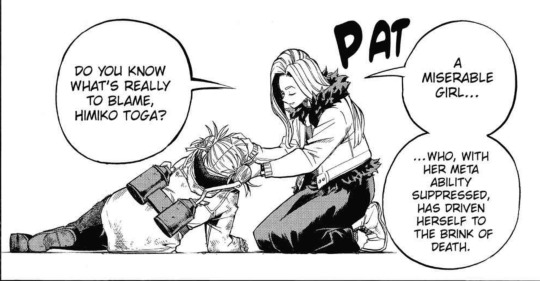

Additionally, as for the believability of a character getting a new chance after so much destruction and murder... well, it’s kinda a thing in shonen and even in seinen? For better or for worse, it’s a thing. We have Vegeta in Dragon Ball Z and Kaneki Ken in Tokyo Ghoul (Kaneki, by the way, is absolutely an inspiration for Shigaraki). We can debate how well-written these redemptions are (I personally have been quite critical of Kaneki’s despite wanting it to happen narratively), but it can be done. BNHA’s Japan especially isn’t as harsh a world as Tokyo Ghoul’s Japan, so it would make even more sense for something like Kaneki’s ending.
The reality is that the cycle of revenge via hurting people and then leaving hurting families and loved ones has to stop somewhere. Someone has to be the bigger person and step up and be like “naw.” That’s heroic. That’s brave. That’s sacrificial itself. Justice itself doesn’t really exist in its purest form without mercy.
There’s another genre-reason I don’t see death or jail as likely (I could see, like, maybe a mental health ward like Rei’s? But it’s too soon to speculate).
If saving is considered a good thing for the story, if it’s truly the highest ideal, then saving someone should be rewarded by the narrative. The characters who save should have a positive result to show us this a good thing.
This is why it doesn’t work for the heroes’ end journey to be accepting that some people cannot be saved. The notion of just accepting that you cannot do something, you cannot save everyone, you cannot, cannot, cannot, is called out as a flaw of society. Determination, on the other hand, is rewarded.
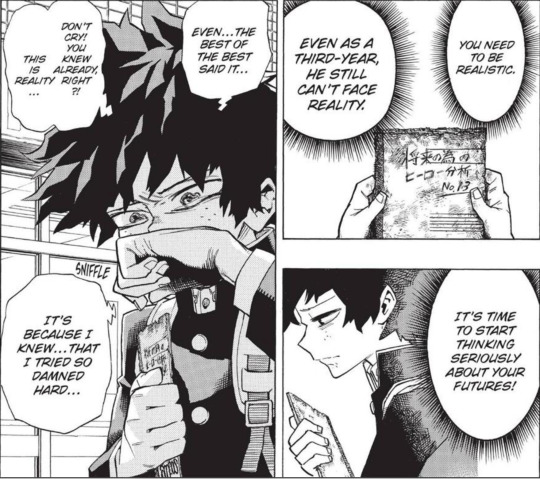
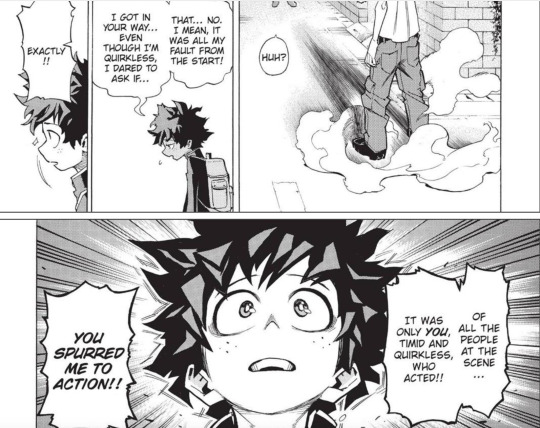
We see it with Deku as well as with Mirio.
So, what if they save them and the redeemed characters then go on to sacrifice themselves in their redemption and die (come to the same end)? If saving changes absolutely nothing for the saved person, if it’s too late for the saved from themselves to change and/or do anything that matters besides die, then the narrative theme of saving as important is left unemphasized at best and undermined at worst. Simple intrinsic knowledge that the kids “did the right thing” doesn’t cut it for a story with so much focus on physical saving when the kids are already doing the right thing; moral struggles about whether to choose to be good aren’t really Deku, Ochaco, or Shouto’s arcs. It works for Aizawa’s arc with Kurogiri, but not for the kiddos. If BNHA was more of a philosophical/spiritual text, that would indeed make sense, but it is not. Genre-wise, BNHA is a fantastical superhero optimistic story, not a gritty real-world set drama.
#bnha meta#mha meta#bnha 295#mha 295#deku#league of villains#shigaraki tomura#shimura tenko#todoroki shouto#todoroki touya#todoroki enji#endeavor#todoroki family#toga himiko#all for one#afo#uraraka ochako#bakugou katsuki#aizawa shouta#bnha theory#mha theory#my hero academia#boku no hero academia#midoriya izuku#kurogiri
639 notes
·
View notes
Text
The Strength of Selfishness
Each character in BSD has a degree of selfishness or selflessness in themselves, but the way this concept is executed opens discussion on the nuance of “selfishness,” or specifically the flaws in believing selfishness is an inherently bad trait.
Atsushi
Atsushi fits the description of selflessness, but I’d argue that he’s actually more selfish than he thinks he is (keeping in mind that being selfish isn’t necessarily a bad thing).
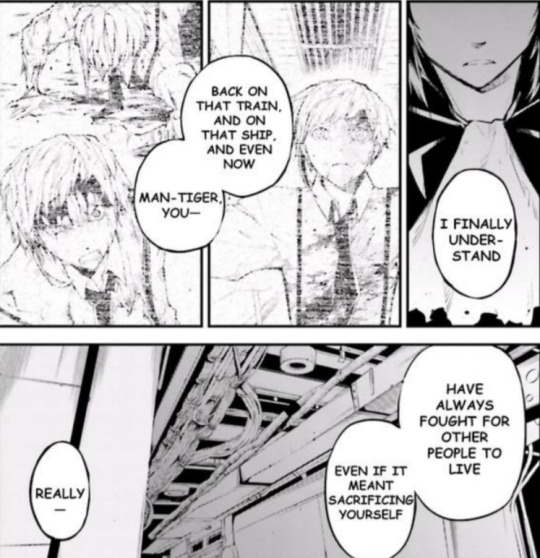
Akutagawa points out how Atsushi will needlessly risk his life in order to protect others, which sounds like a pretty heroic act, but it comes with a cost. Atsushi isn’t invincible, especially at this point in the story when he hasn’t fully mastered his ability, but his insistence on protecting others puts him in constant danger.
At the end of the day, Atsushi would have a greater chance of surviving many of the dangerous situations he puts himself into if he was more selfish by protecting himself before others.
However, Atsushi is also somewhat selfish in his motivations for acting so virtuously.
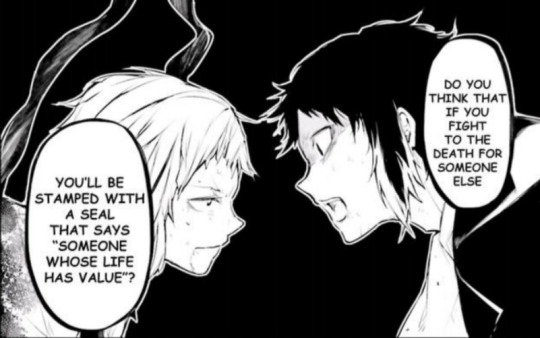
Once again, Akutagawa points out how Atsushi only acts this way because of his deeply rooted belief that he has to risk his life for someone else in order to give his life value. You could argue that Atsushi only saves others as an attempt to prove to himself that he’s worthy, an inherently selfish motive. If Atsushi actually died, he would be endangering the people he could save in the future.
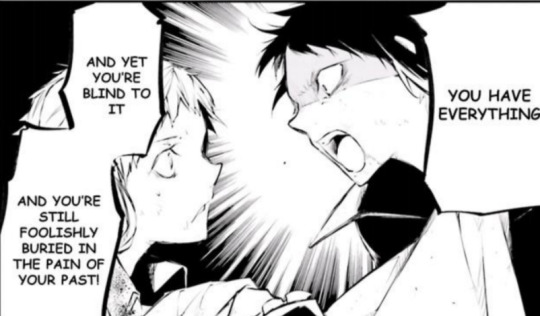
Selfishness also includes self-centeredness. Particularly with Akutagawa, Atsushi’s tendency to focus solely on himself becomes especially noticeable. Atsushi constantly doubts himself and his strengths; he also ignores his privileges and the struggles of others, particularly when he can’t completely understand them — hence why he views Akutagawa so harshly but sees Kyouka and Lucy as people who need to be saved.
Despite all of this, Atsushi still creates a positive impact in other people’s lives. His innately selfish motivation is what drives him to protect others, and he ultimately succeeds in doing that (case in point Kyouka and Lucy again).
Akutagawa
Akutagawa is pretty similar to Atsushi in how his past led to his inevitably selfish motives, but his manifests in a different way.

Akutagawa has to be selfish to protect himself, due to a mix of his past prior to joining the mafia and Dazai’s teachings that collectively reinforced the belief that if he’s weak, he can’t survive.
This results in Akutagawa taking other people’s lives, a direct contrast to how Atsushi saves others, in order to prove his worth as a strong individual that deserves to live. However, this sentiment narrowly crosses the line of hypocrisy when Akutagawa does the very same thing that he criticized Atsushi for: looking for value in his life through other people.
Akutagawa also unnecessarily risks his life in order to prove his strength, which is arguably more dangerous and selfish than what Atsushi does.

When Akutagawa fights Hawthorne, he practically eggs on Hawthorne to kill him, or at the very least fight with the intent to kill. Akutagawa was also injured before entering this fight, so running away would’ve been all the more reasonable than continuing to fight.

Drawing another parallel to Atsushi, Akutagawa has that very same resolve of risking his life unnecessarily to prove his worth.
It’s undeniable that Akutagawa has killed many people — which is arguably extremely selfish — and loss of life really isn’t something that I want to push as morally correct. However, I would like to push the idea of redemption: finding a way to escape this messy lifestyle. I sincerely doubt that the incessant cycle of killing is any good for Akutagawa, or that it’s the life that he wants to have.
With Atsushi and Akutagawa, both of their character arcs will develop accordingly to this balance of selfishness and selflessness.
Ranpo
Ranpo is characterized in a slightly selfish way, but this mindset comes with good reason (relating to Ranpo’s past).
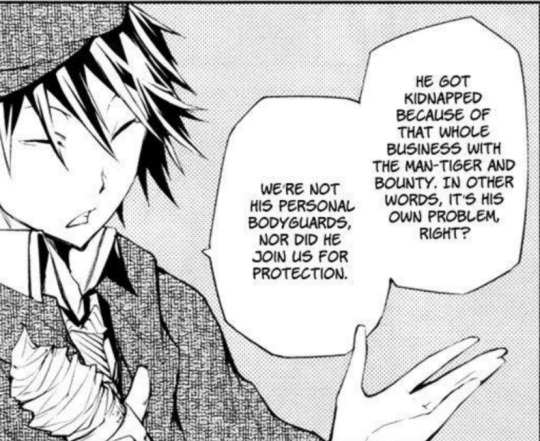
When Atsushi was kidnapped, Ranpo places priority on protecting the agency. If he were to meddle with Atsushi’s problem, which was technically a personal issue, then the agency as an organization would be put at risk. This isn’t necessarily a “wrong” mindset, but it is self-centered.
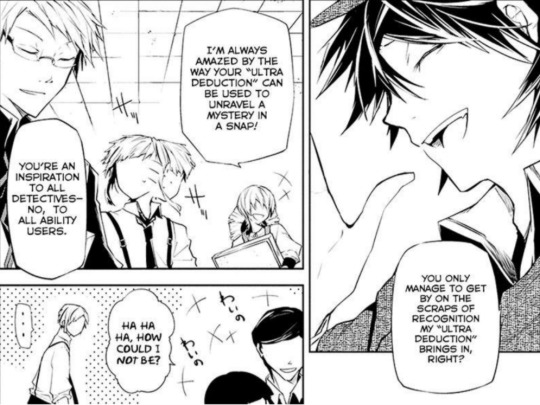
Of course, this is one of many examples to showcase Ranpo’s arrogance, but his arrogance is actually a form of self-protection.
“So his father knew, after all. He understood that Ranpo possessed an extraordinary gift. He knew his son had the special ability to observe, remember, and uncover the truth in the blink of an eye. That was why he sealed it away. He didn’t want Ranpo to go astray, to ever hurt others and make the world his enemy. His father wanted Ranpo to learn virtue and what’s right just like any ordinary person until he had grown up with good judgment and knowledge.” — LN 3, “The Untold Origins of the Detective Agency”
Before Ranpo met Fukuzawa, he was just a young, lost boy who didn’t recognize his extraordinary talents. His parents taught him to be modest to allow him to develop as a normal person, but he never truly understood who he was in comparison to other people because he was orphaned at a young age.
Thus, Ranpo had to embrace his superiority, in an albeit dramatic way, in order to accept the world and himself. If he believed that people weren’t as intelligent as him, then he wouldn’t have to hate himself for feeling like an outsider to a world he doesn’t understand.
Similarly to Akutagawa, Ranpo’s selfishness isn’t born out of hatred or negligence for others, it’s simply a survivalist instinct.
Dazai
Dazai’s case is a little trickier to define, but I feel that he’s changed a decent amount throughout the series. I’ve seen some people argue that Dazai only helps others because of Oda’s dying wish, which would make his motivations for doing so inherently selfish. This rings true for Dazai before becoming a part of the agency, but I’d say he’s changed a lot just from interacting with the other agency members.

Dazai’s shown to be capable of the selflessness that involves risking your life for others, but because he’s Dazai, he’s most likely never going to actually die (he has taken necessary precautions to make sure he doesn’t die like in Dead Apple). In this case, Dazai was willing to risk his life for intel from Fyodor, similar to how he got captured by the PM intentionally for intel on Atsushi.
What he says here is especially important: “Certainly, people are sinfully stupid. But what’s so wrong about that?” The Dazai that was once isolated from others, that lacked a sense of direction and purpose in life, has grown one step closer to finding that purpose.
It’s no secret that character to character relationships have a big impact on everyone in BSD, but it’s especially relevant for Dazai who’s growth comes from learning about human nature. He and Fyodor both share a level of super intelligence that ostracizes them from the rest of society, which consequently makes them incapable of understanding other people.
Dazai’s statement here just shows how he’s willing to look past people’s mistakes — yes, they may be sinful and/or stupid, but that’s just a part of human nature.
And in this case, he acts in a stupid way by risking his life for someone else. Yes, it may be stupid, but this selflessness is also a part of being human.
I’d also like to add that Dazai was somewhat selfish in leaving the PM so suddenly after Oda’s death. As an executive, he undoubtedly had some responsibilities to handle, and not to mention Chuuya who was dragged into the mafia because of him in the first place. However, leaving the mafia was ultimately better for his development, and you could argue that the PM is doing just fine with Mori remaining as the leader. Thus, Dazai is another example of how selfishness isn’t harmful in nature.
Mori
On the topic of Mori, he’s a character who outright acknowledges his selflessness as a necessity for the mafia’s advancement.
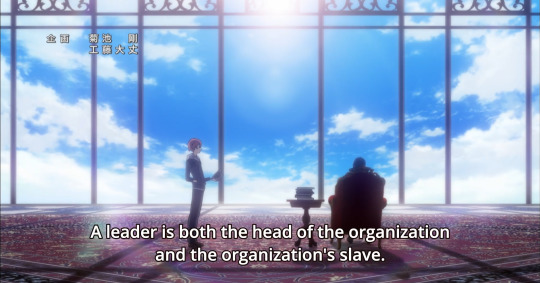


As I mentioned before, selflessness is a stereotypically heroic trait, but it’s flipped around in BSD. You see protagonists with greater selfish convictions than the antagonists, who live their life based on this idea of selflessness.
Of course, just because Mori is an antagonist, this doesn’t mean that selflessness is an innately “evil” trait. In fact, this selflessness is how he grows his organization and gains respect from his subordinates. Mori’s selflessness is used for the benefit of everyone else in the PM (ignoring the obvious crimes that the mafia commits of course).
Oda
Oda is often seen as the role model example for a “good man,” in the world of BSD — which is true to a certain extent. We certainly know how he was selfless in a multitude of scenarios, from saving the orphans at the Dragon’s Head Conflict, to his resolve to not kill anyone, and his push for Dazai to leave the mafia.
However, I’d like to discuss Oda’s selfishness. Oda was well-aware of Dazai’s issues during Dark Era, and he seemed like the only person who would understand Dazai at that level. Despite this, he still chose to die.
“(Dazai) is just a child who’s too smart. Just a crying child who’s been left alone in the darkness, a world of nothingness far emptier than the world we can see.”
— LN 2, “Osamu Dazai and the Dark Era”
Oda is an idealist first and foremost; when reality fails to match his ideals, it becomes unbearable for him to continue living on.
Oda was selfish in his conviction to die, because he knew he could’ve done more for Dazai, but he chose to leave him with a dying wish rather than staying with him to potentially fill that void of loneliness.
(I’d like to mention that Oda wasn’t wrong for his choice, because Dazai ended up on the right path in the end. It was simply an act of selfishness that ended for the better).
Kunikida
Kunikida is an idealist, much like Oda, but he also draws close to being a realist at certain moments.

Kunikida shares the same selfless resolve as Atsushi: to save everyone. His ideals seem unbreakable to the point where he would risk his life and succeed in the end no matter what, purely because he’s just that committed towards his goals.
This treads closely to Atsushi’s selfishness. In this case, for Kunikida, it’s somewhat a part of his self-fulfilling prophecy to make his ideals come true, but he acts selflessly because of these ideals that he believes in.
An important thing to note here is Fyodor’s grin, because Fyodor — as an idealist — is well aware of the fact that the greater the ideals, the loftier these ideals become in reality.
“By that very logic, then Miss Sasaki was not responsible for any of these recent events! She didn’t even want a world in which all criminals are rightly judged! She only— Tell me, Dazai! Was it right for her to die? Is this the ideal world I’ve sought for…”
— LN 1, “Osamu Dazai’s Entrance Exam”
At the end of the Azure Messenger Arc, Kunikida realizes the flaws in his ideals when he fails to uphold them. By trying to save both Rokuzou and Sasaki, he ended up losing the both of them. No matter how hard he tried to save them, there was no possible way for him to achieve the level of “justice” that he desired.
This teaches an incredibly valuable lesson to Kunikida that shifts his mindset towards a more selfish direction.

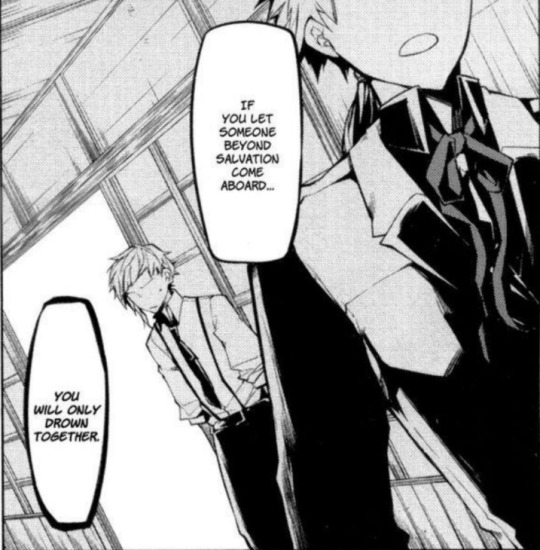
Kunikida’s experience leads him to teach Atsushi, another person strongly motivated by ideals, to not follow the same path as him. You could interpret this as a sign of Kunikida’s declining resolve, but I prefer to view it as another form of self-preservation.
Kunikida very well understands the pain that comes from not meeting his ideals, which could easily affect to Atsushi considering how difficult it would be to save Kyouka.
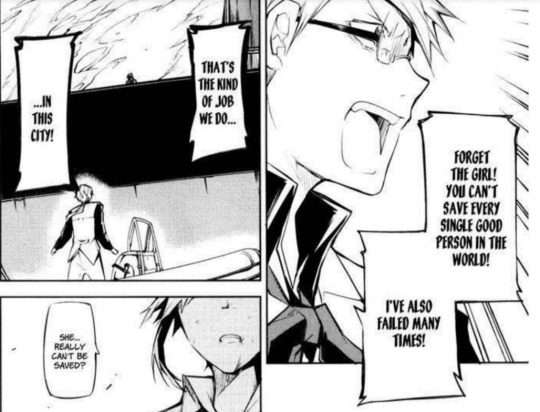
The scene in which Kunikida goes to save Atsushi parallels what Kunikida told him previously: “Your boat can only carry one person. If you let someone beyond salvation come aboard, you will only drown together.”
Notice how Kunikida is in a boat with plenty of space, but out of fear that his ideals won’t be upheld, he’ll lower them to an lesser standard. Instead of trying to save two people, he settles for one, despite the fact that he has the capacity for two.
This instance is a moment of selfishness from Kunikida, an act of self-preservation to prevent the inevitable pain that comes with unmet ideals.
However, Atsushi subverts his expectations by pushing himself to save Kyouka regardless of his sinking boat, because Atsushi’s own ideals motivate him to do so. Kunikida teaches Atsushi to be careful with the balance of selfishness and selflessness; Atsushi teaches Kunikida the beauty in being selfless.
#bsd#bungou stray dogs#bsd meta#bsd atsushi#bsd akutagawa#bsd rampo#bsd dazai#bsd mori#bsd oda#bsd kunikida#idk what an idealist is tbh
299 notes
·
View notes